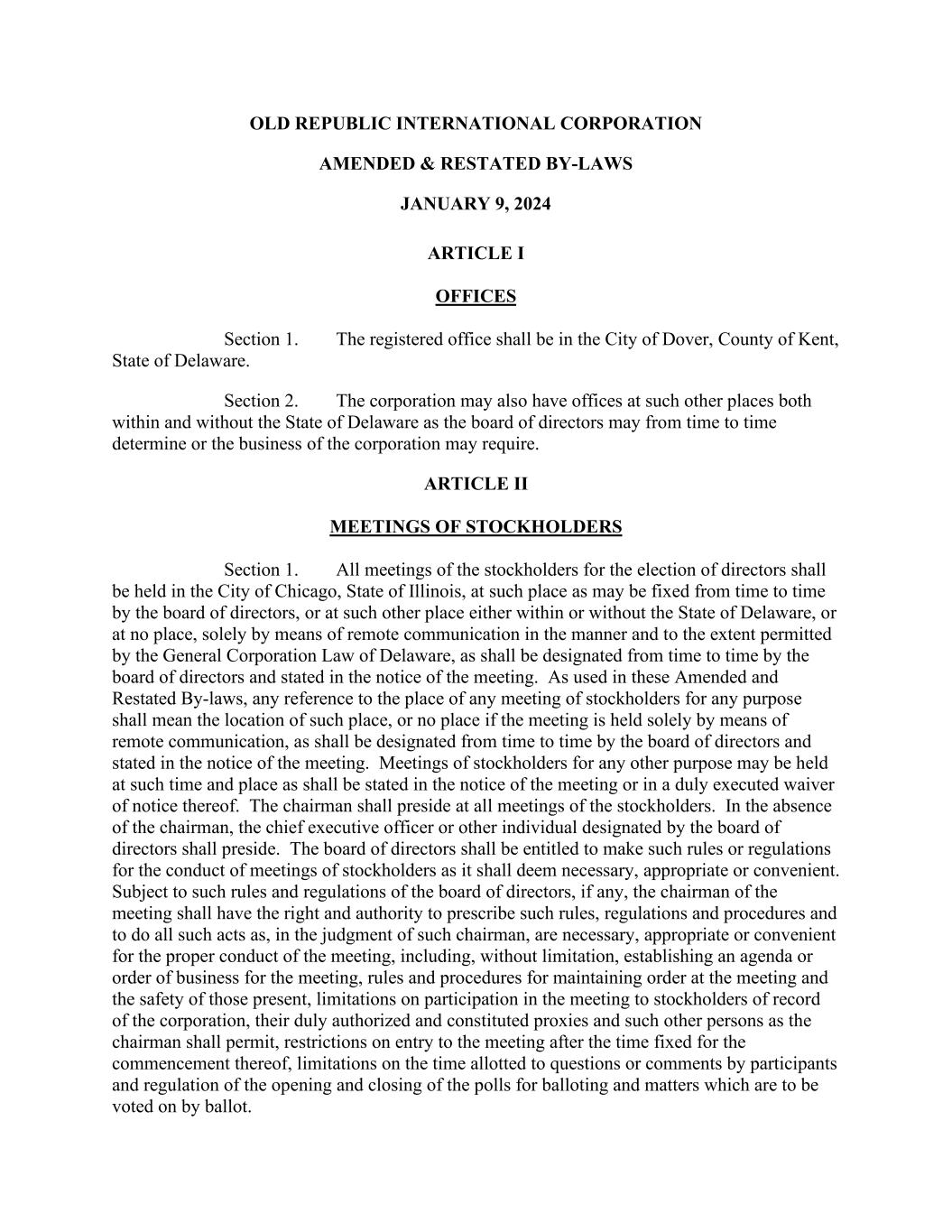
OLD REPUBLIC INTERNATIONAL CORPORATION AMENDED & RESTATED BY-LAWS JANUARY 9, 2024 ARTICLE I OFFICES Section 1. The registered office shall be in the City of Dover, County of Kent, State of Delaware. Section 2. The corporation may also have offices at such other places both within and without the State of Delaware as the board of directors may from time to time determine or the business of the corporation may require. ARTICLE II MEETINGS OF STOCKHOLDERS Section 1. All meetings of the stockholders for the election of directors shall be held in the City of Chicago, State of Illinois, at such place as may be fixed from time to time by the board of directors, or at such other place either within or without the State of Delaware, or at no place, solely by means of remote communication in the manner and to the extent permitted by the General Corporation Law of Delaware, as shall be designated from time to time by the board of directors and stated in the notice of the meeting. As used in these Amended and Restated By-laws, any reference to the place of any meeting of stockholders for any purpose shall mean the location of such place, or no place if the meeting is held solely by means of remote communication, as shall be designated from time to time by the board of directors and stated in the notice of the meeting. Meetings of stockholders for any other purpose may be held at such time and place as shall be stated in the notice of the meeting or in a duly executed waiver of notice thereof. The chairman shall preside at all meetings of the stockholders. In the absence of the chairman, the chief executive officer or other individual designated by the board of directors shall preside. The board of directors shall be entitled to make such rules or regulations for the conduct of meetings of stockholders as it shall deem necessary, appropriate or convenient. Subject to such rules and regulations of the board of directors, if any, the chairman of the meeting shall have the right and authority to prescribe such rules, regulations and procedures and to do all such acts as, in the judgment of such chairman, are necessary, appropriate or convenient for the proper conduct of the meeting, including, without limitation, establishing an agenda or order of business for the meeting, rules and procedures for maintaining order at the meeting and the safety of those present, limitations on participation in the meeting to stockholders of record of the corporation, their duly authorized and constituted proxies and such other persons as the chairman shall permit, restrictions on entry to the meeting after the time fixed for the commencement thereof, limitations on the time allotted to questions or comments by participants and regulation of the opening and closing of the polls for balloting and matters which are to be voted on by ballot.
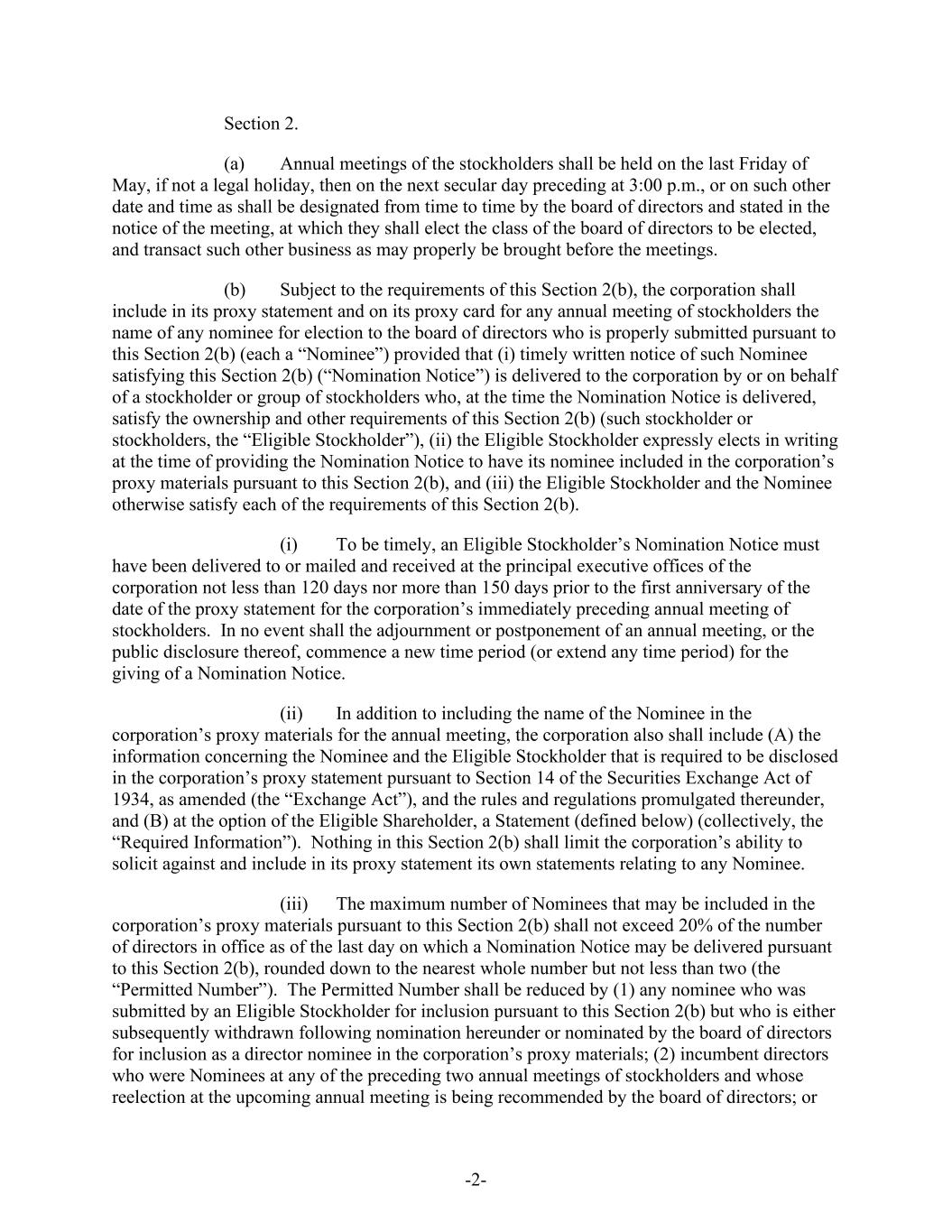
-2- Section 2. (a) Annual meetings of the stockholders shall be held on the last Friday of May, if not a legal holiday, then on the next secular day preceding at 3:00 p.m., or on such other date and time as shall be designated from time to time by the board of directors and stated in the notice of the meeting, at which they shall elect the class of the board of directors to be elected, and transact such other business as may properly be brought before the meetings. (b) Subject to the requirements of this Section 2(b), the corporation shall include in its proxy statement and on its proxy card for any annual meeting of stockholders the name of any nominee for election to the board of directors who is properly submitted pursuant to this Section 2(b) (each a “Nominee”) provided that (i) timely written notice of such Nominee satisfying this Section 2(b) (“Nomination Notice”) is delivered to the corporation by or on behalf of a stockholder or group of stockholders who, at the time the Nomination Notice is delivered, satisfy the ownership and other requirements of this Section 2(b) (such stockholder or stockholders, the “Eligible Stockholder”), (ii) the Eligible Stockholder expressly elects in writing at the time of providing the Nomination Notice to have its nominee included in the corporation’s proxy materials pursuant to this Section 2(b), and (iii) the Eligible Stockholder and the Nominee otherwise satisfy each of the requirements of this Section 2(b). (i) To be timely, an Eligible Stockholder’s Nomination Notice must have been delivered to or mailed and received at the principal executive offices of the corporation not less than 120 days nor more than 150 days prior to the first anniversary of the date of the proxy statement for the corporation’s immediately preceding annual meeting of stockholders. In no event shall the adjournment or postponement of an annual meeting, or the public disclosure thereof, commence a new time period (or extend any time period) for the giving of a Nomination Notice. (ii) In addition to including the name of the Nominee in the corporation’s proxy materials for the annual meeting, the corporation also shall include (A) the information concerning the Nominee and the Eligible Stockholder that is required to be disclosed in the corporation’s proxy statement pursuant to Section 14 of the Securities Exchange Act of 1934, as amended (the “Exchange Act”), and the rules and regulations promulgated thereunder, and (B) at the option of the Eligible Shareholder, a Statement (defined below) (collectively, the “Required Information”). Nothing in this Section 2(b) shall limit the corporation’s ability to solicit against and include in its proxy statement its own statements relating to any Nominee. (iii) The maximum number of Nominees that may be included in the corporation’s proxy materials pursuant to this Section 2(b) shall not exceed 20% of the number of directors in office as of the last day on which a Nomination Notice may be delivered pursuant to this Section 2(b), rounded down to the nearest whole number but not less than two (the “Permitted Number”). The Permitted Number shall be reduced by (1) any nominee who was submitted by an Eligible Stockholder for inclusion pursuant to this Section 2(b) but who is either subsequently withdrawn following nomination hereunder or nominated by the board of directors for inclusion as a director nominee in the corporation’s proxy materials; (2) incumbent directors who were Nominees at any of the preceding two annual meetings of stockholders and whose reelection at the upcoming annual meeting is being recommended by the board of directors; or

-3- (3) incumbent directors or director candidates (including, without limitation, candidates who are not Nominees) who in either case will be included in the corporation’s proxy materials with respect to such annual meeting as unopposed (by the corporation) nominees pursuant to any agreement, arrangement or other understanding with any stockholder or group of stockholders (other than any such agreement, arrangement or understanding entered into in connection with an acquisition of capital stock, by the stockholder or group of stockholders, from the corporation). In the event that one or more vacancies for any reason occurs on the board of directors after the nomination deadline but prior to the date of the annual meeting of stockholders, and the board of directors resolves to reduce the size of the board of directors in connection therewith, the Permitted Number shall be calculated based on the number of directors in office as so reduced. In the event that the number of Nominees submitted by Eligible Stockholders pursuant to this Section 2(b) exceeds the Permitted Number, each Eligible Stockholder shall select one Nominee for inclusion in the corporation’s proxy materials until the Permitted Number is reached, going in order of the amount (greatest to least) of voting power of the corporation’s capital stock entitled to vote on the election of directors as disclosed in the Nomination Notice. (iv) An Eligible Stockholder must have owned (as defined below) continuously for at least 3 years a number of shares that represents 3% or more of the total voting power of the corporation’s outstanding shares of capital stock entitled to vote in the election of directors as of the most recent date for which such amount is given in any filing by the corporation with the Securities and Exchange Commission prior to the submission of the Nomination Notice (the “Required Shares”) as of both the date the Nomination Notice is timely delivered to or received by the corporation and the record date for determining stockholders entitled to vote at the annual meeting and must continue to own the Required Shares through the date of the annual meeting. For purposes of satisfying the ownership requirement under this Section 2(b), the voting power represented by the shares of the corporation’s capital stock owned by one or more stockholders, or by the person or persons who own shares of the corporation’s capital stock and on whose behalf any stockholder is acting, may be aggregated, provided that the number of stockholders and other persons whose ownership of shares is aggregated for such purpose shall not exceed 20. If two or more funds are (A) under common management and investment control; (B) under common management and funded primarily by the same employer (or by a group of related employers that are under common control); or (C) a “group of investment companies,” as such term is defined in Section 12(d)(1)(G)(ii) of the Investment Company Act of 1940, as amended, they shall be treated as one stockholder or person for the purpose of determining the aggregate number of stockholders. With respect to any one annual meeting of stockholders, no person may be a member of more than one group of persons constituting an Eligible Stockholder under this Section 2(b). (v) For purposes of this Section 2(b), an Eligible Stockholder shall be deemed to “own” only those outstanding shares of the corporation’s capital stock as to which the person possesses both (A) the full voting and investment rights pertaining to the shares; and (B) the full economic interest in (including the opportunity for profit and risk of loss on) such shares; provided that the number of shares calculated in accordance with clauses (A) and (B) shall not include any shares (1) sold by such person or any of its affiliates in any transaction that has not been settled or closed, (2) borrowed by such person or any of its affiliates for any purposes or purchased by such person or any of its affiliates pursuant to an agreement to resell, or (3) subject to any option, warrant, forward contract, swap, contract of sale, other derivative or similar
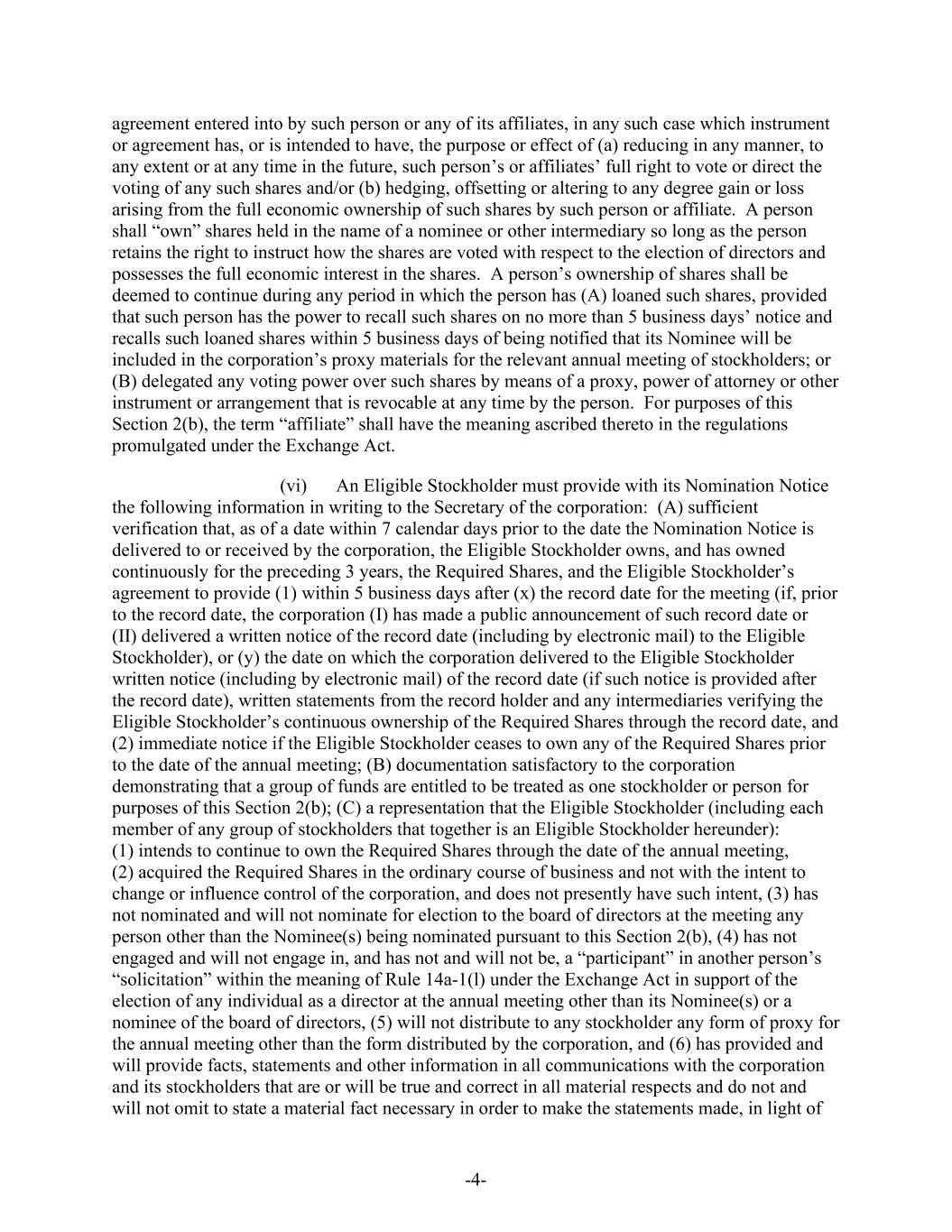
-4- agreement entered into by such person or any of its affiliates, in any such case which instrument or agreement has, or is intended to have, the purpose or effect of (a) reducing in any manner, to any extent or at any time in the future, such person’s or affiliates’ full right to vote or direct the voting of any such shares and/or (b) hedging, offsetting or altering to any degree gain or loss arising from the full economic ownership of such shares by such person or affiliate. A person shall “own” shares held in the name of a nominee or other intermediary so long as the person retains the right to instruct how the shares are voted with respect to the election of directors and possesses the full economic interest in the shares. A person’s ownership of shares shall be deemed to continue during any period in which the person has (A) loaned such shares, provided that such person has the power to recall such shares on no more than 5 business days’ notice and recalls such loaned shares within 5 business days of being notified that its Nominee will be included in the corporation’s proxy materials for the relevant annual meeting of stockholders; or (B) delegated any voting power over such shares by means of a proxy, power of attorney or other instrument or arrangement that is revocable at any time by the person. For purposes of this Section 2(b), the term “affiliate” shall have the meaning ascribed thereto in the regulations promulgated under the Exchange Act. (vi) An Eligible Stockholder must provide with its Nomination Notice the following information in writing to the Secretary of the corporation: (A) sufficient verification that, as of a date within 7 calendar days prior to the date the Nomination Notice is delivered to or received by the corporation, the Eligible Stockholder owns, and has owned continuously for the preceding 3 years, the Required Shares, and the Eligible Stockholder’s agreement to provide (1) within 5 business days after (x) the record date for the meeting (if, prior to the record date, the corporation (I) has made a public announcement of such record date or (II) delivered a written notice of the record date (including by electronic mail) to the Eligible Stockholder), or (y) the date on which the corporation delivered to the Eligible Stockholder written notice (including by electronic mail) of the record date (if such notice is provided after the record date), written statements from the record holder and any intermediaries verifying the Eligible Stockholder’s continuous ownership of the Required Shares through the record date, and (2) immediate notice if the Eligible Stockholder ceases to own any of the Required Shares prior to the date of the annual meeting; (B) documentation satisfactory to the corporation demonstrating that a group of funds are entitled to be treated as one stockholder or person for purposes of this Section 2(b); (C) a representation that the Eligible Stockholder (including each member of any group of stockholders that together is an Eligible Stockholder hereunder): (1) intends to continue to own the Required Shares through the date of the annual meeting, (2) acquired the Required Shares in the ordinary course of business and not with the intent to change or influence control of the corporation, and does not presently have such intent, (3) has not nominated and will not nominate for election to the board of directors at the meeting any person other than the Nominee(s) being nominated pursuant to this Section 2(b), (4) has not engaged and will not engage in, and has not and will not be, a “participant” in another person’s “solicitation” within the meaning of Rule 14a-1(l) under the Exchange Act in support of the election of any individual as a director at the annual meeting other than its Nominee(s) or a nominee of the board of directors, (5) will not distribute to any stockholder any form of proxy for the annual meeting other than the form distributed by the corporation, and (6) has provided and will provide facts, statements and other information in all communications with the corporation and its stockholders that are or will be true and correct in all material respects and do not and will not omit to state a material fact necessary in order to make the statements made, in light of
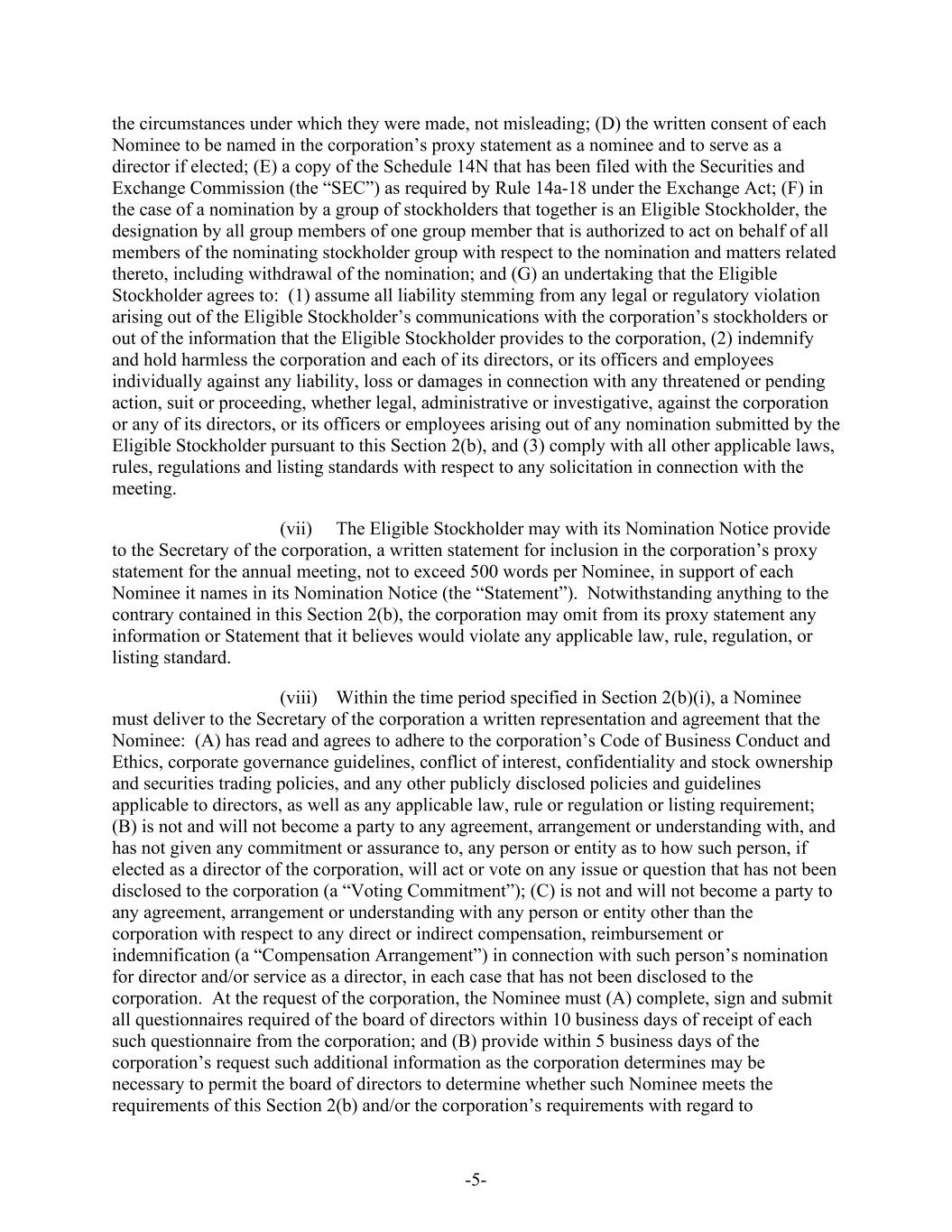
-5- the circumstances under which they were made, not misleading; (D) the written consent of each Nominee to be named in the corporation’s proxy statement as a nominee and to serve as a director if elected; (E) a copy of the Schedule 14N that has been filed with the Securities and Exchange Commission (the “SEC”) as required by Rule 14a-18 under the Exchange Act; (F) in the case of a nomination by a group of stockholders that together is an Eligible Stockholder, the designation by all group members of one group member that is authorized to act on behalf of all members of the nominating stockholder group with respect to the nomination and matters related thereto, including withdrawal of the nomination; and (G) an undertaking that the Eligible Stockholder agrees to: (1) assume all liability stemming from any legal or regulatory violation arising out of the Eligible Stockholder’s communications with the corporation’s stockholders or out of the information that the Eligible Stockholder provides to the corporation, (2) indemnify and hold harmless the corporation and each of its directors, or its officers and employees individually against any liability, loss or damages in connection with any threatened or pending action, suit or proceeding, whether legal, administrative or investigative, against the corporation or any of its directors, or its officers or employees arising out of any nomination submitted by the Eligible Stockholder pursuant to this Section 2(b), and (3) comply with all other applicable laws, rules, regulations and listing standards with respect to any solicitation in connection with the meeting. (vii) The Eligible Stockholder may with its Nomination Notice provide to the Secretary of the corporation, a written statement for inclusion in the corporation’s proxy statement for the annual meeting, not to exceed 500 words per Nominee, in support of each Nominee it names in its Nomination Notice (the “Statement”). Notwithstanding anything to the contrary contained in this Section 2(b), the corporation may omit from its proxy statement any information or Statement that it believes would violate any applicable law, rule, regulation, or listing standard. (viii) Within the time period specified in Section 2(b)(i), a Nominee must deliver to the Secretary of the corporation a written representation and agreement that the Nominee: (A) has read and agrees to adhere to the corporation’s Code of Business Conduct and Ethics, corporate governance guidelines, conflict of interest, confidentiality and stock ownership and securities trading policies, and any other publicly disclosed policies and guidelines applicable to directors, as well as any applicable law, rule or regulation or listing requirement; (B) is not and will not become a party to any agreement, arrangement or understanding with, and has not given any commitment or assurance to, any person or entity as to how such person, if elected as a director of the corporation, will act or vote on any issue or question that has not been disclosed to the corporation (a “Voting Commitment”); (C) is not and will not become a party to any agreement, arrangement or understanding with any person or entity other than the corporation with respect to any direct or indirect compensation, reimbursement or indemnification (a “Compensation Arrangement”) in connection with such person’s nomination for director and/or service as a director, in each case that has not been disclosed to the corporation. At the request of the corporation, the Nominee must (A) complete, sign and submit all questionnaires required of the board of directors within 10 business days of receipt of each such questionnaire from the corporation; and (B) provide within 5 business days of the corporation’s request such additional information as the corporation determines may be necessary to permit the board of directors to determine whether such Nominee meets the requirements of this Section 2(b) and/or the corporation’s requirements with regard to
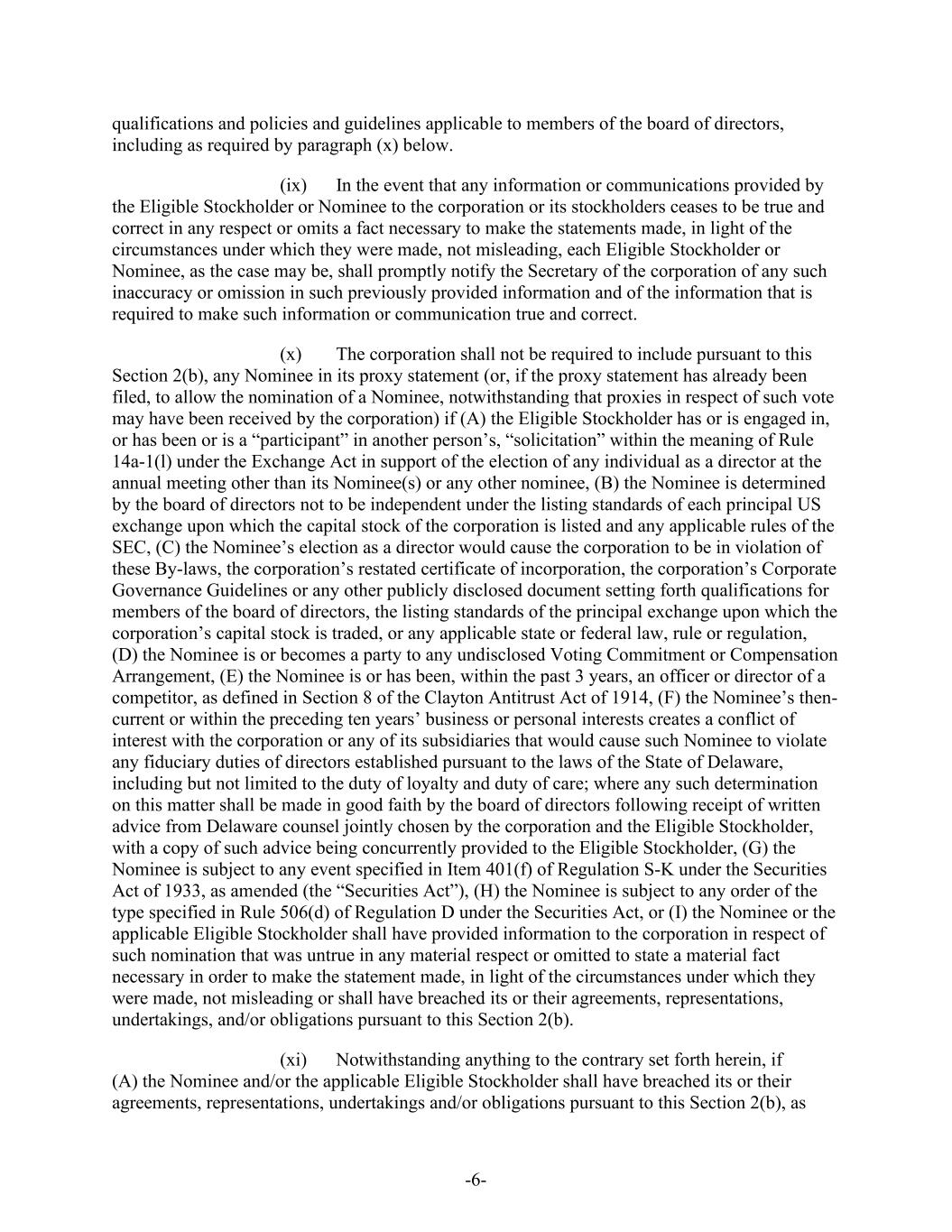
-6- qualifications and policies and guidelines applicable to members of the board of directors, including as required by paragraph (x) below. (ix) In the event that any information or communications provided by the Eligible Stockholder or Nominee to the corporation or its stockholders ceases to be true and correct in any respect or omits a fact necessary to make the statements made, in light of the circumstances under which they were made, not misleading, each Eligible Stockholder or Nominee, as the case may be, shall promptly notify the Secretary of the corporation of any such inaccuracy or omission in such previously provided information and of the information that is required to make such information or communication true and correct. (x) The corporation shall not be required to include pursuant to this Section 2(b), any Nominee in its proxy statement (or, if the proxy statement has already been filed, to allow the nomination of a Nominee, notwithstanding that proxies in respect of such vote may have been received by the corporation) if (A) the Eligible Stockholder has or is engaged in, or has been or is a “participant” in another person’s, “solicitation” within the meaning of Rule 14a-1(l) under the Exchange Act in support of the election of any individual as a director at the annual meeting other than its Nominee(s) or any other nominee, (B) the Nominee is determined by the board of directors not to be independent under the listing standards of each principal US exchange upon which the capital stock of the corporation is listed and any applicable rules of the SEC, (C) the Nominee’s election as a director would cause the corporation to be in violation of these By-laws, the corporation’s restated certificate of incorporation, the corporation’s Corporate Governance Guidelines or any other publicly disclosed document setting forth qualifications for members of the board of directors, the listing standards of the principal exchange upon which the corporation’s capital stock is traded, or any applicable state or federal law, rule or regulation, (D) the Nominee is or becomes a party to any undisclosed Voting Commitment or Compensation Arrangement, (E) the Nominee is or has been, within the past 3 years, an officer or director of a competitor, as defined in Section 8 of the Clayton Antitrust Act of 1914, (F) the Nominee’s then- current or within the preceding ten years’ business or personal interests creates a conflict of interest with the corporation or any of its subsidiaries that would cause such Nominee to violate any fiduciary duties of directors established pursuant to the laws of the State of Delaware, including but not limited to the duty of loyalty and duty of care; where any such determination on this matter shall be made in good faith by the board of directors following receipt of written advice from Delaware counsel jointly chosen by the corporation and the Eligible Stockholder, with a copy of such advice being concurrently provided to the Eligible Stockholder, (G) the Nominee is subject to any event specified in Item 401(f) of Regulation S-K under the Securities Act of 1933, as amended (the “Securities Act”), (H) the Nominee is subject to any order of the type specified in Rule 506(d) of Regulation D under the Securities Act, or (I) the Nominee or the applicable Eligible Stockholder shall have provided information to the corporation in respect of such nomination that was untrue in any material respect or omitted to state a material fact necessary in order to make the statement made, in light of the circumstances under which they were made, not misleading or shall have breached its or their agreements, representations, undertakings, and/or obligations pursuant to this Section 2(b). (xi) Notwithstanding anything to the contrary set forth herein, if (A) the Nominee and/or the applicable Eligible Stockholder shall have breached its or their agreements, representations, undertakings and/or obligations pursuant to this Section 2(b), as

-7- determined by the board of directors; or (B) the Eligible Stockholder (or a qualified representative thereof) does not appear at the meeting to present any nomination pursuant to this Section 2(b), (x) the board of directors shall be entitled to declare a nomination by an Eligible Stockholder to be invalid, and such nomination shall be disregarded notwithstanding that proxies in respect of such vote may have been received by the corporation and (y) the corporation 12/39 shall not be required to include in its proxy materials any successor or replacement nominee proposed by the applicable Eligible Stockholder or any other Eligible Stockholder. (xii) Any Nominee who is included in the corporation’s proxy materials for a particular annual meeting of stockholders but: (A) withdraws from or becomes ineligible or unavailable for election at the annual meeting; or (B) does not receive at least 25% of votes cast in favor of his or her election, shall, in each case, be ineligible to be included in the corporation’s proxy materials as a Nominee pursuant to this Section 2(b) for the next two annual meetings of stockholders. Section 3. Written notice of the annual meeting stating the place, date and hour of the meeting shall be given to each stockholder entitled to vote at such meeting not less than ten nor more than sixty days before the date of the meeting. Section 4. The officer who has charge of the stock ledger of the corporation shall prepare and make, at least ten days before every meeting of stockholders, a complete list of the stockholders entitled to vote at the meeting, arranged in alphabetical order, and showing the address of each stockholder and the number of shares registered in the name of each stockholder. Such list shall be open to the examination of any stockholder for any purpose germane to the meeting for a period of at least ten days prior to the meeting: (i) on a reasonably accessible electronic network, provided that the information required to gain access to such list is provided with the notice of the meeting, or (ii) during ordinary business hours, at the principal place of business of the corporation. In the event that the corporation determines to make the list available on an electronic network, the corporation may take reasonable steps to ensure that such information is available only to stockholders of the corporation. Section 5. Special meetings of the stockholders, for any purpose or purposes, unless otherwise prescribed by statute or by the certificate of incorporation, may be called by the chief executive officer and shall be called by the chief executive officer or secretary at the request in writing of a majority of the board of directors, or at the request in writing of stockholders owning a majority in amount of the entire capital stock of the corporation issued and outstanding and entitled to vote. Such request shall state the purpose or purposes of the proposed meeting. Section 6. Written notice of a special meeting stating the place, date and hour of the meeting and the purpose or purposes for which the meeting is called, shall be given not less than ten nor more than sixty days before the date of the meeting, to each stockholder entitled to vote at such meeting. Section 7. Business transacted at any special meeting of stockholders shall be limited to the purposes stated in the notice.
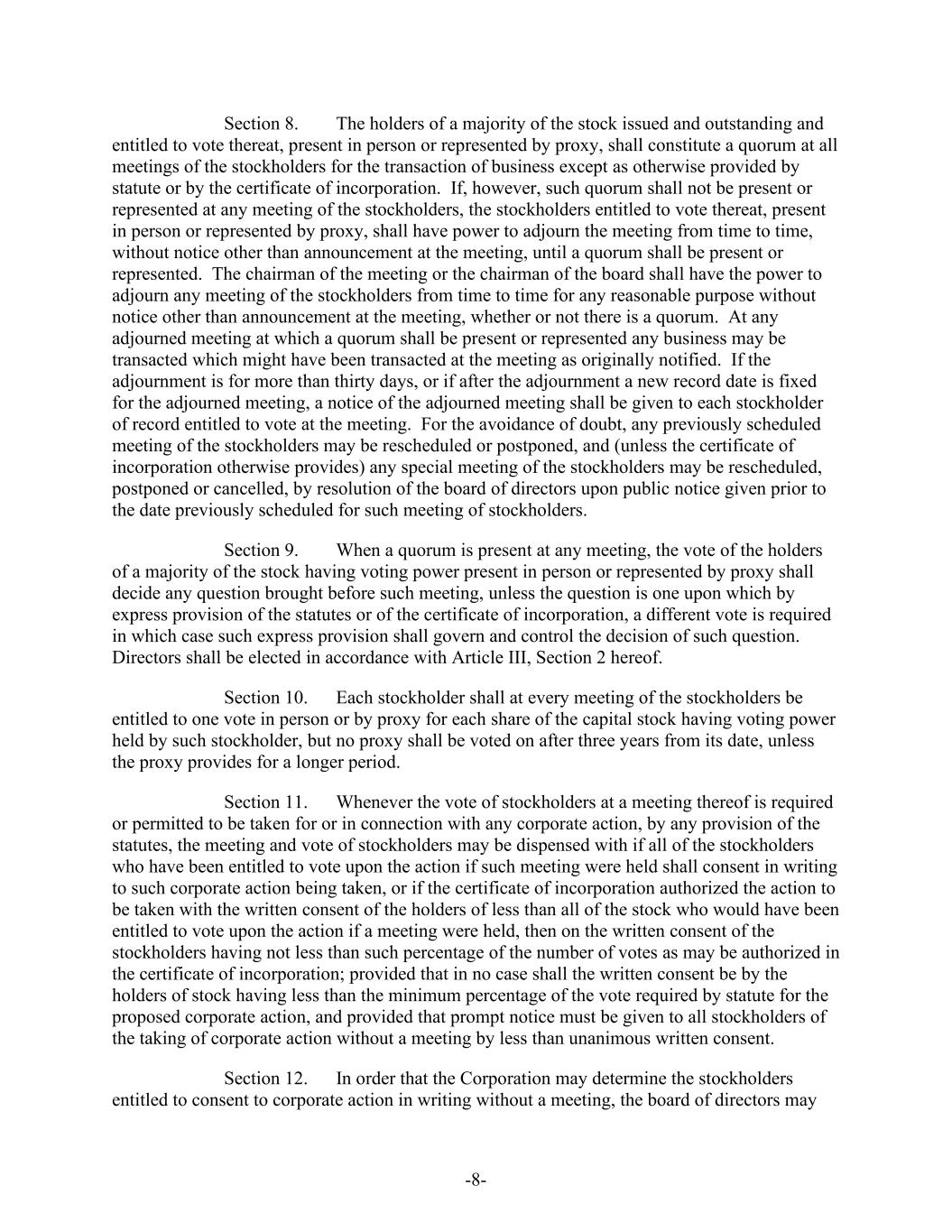
-8- Section 8. The holders of a majority of the stock issued and outstanding and entitled to vote thereat, present in person or represented by proxy, shall constitute a quorum at all meetings of the stockholders for the transaction of business except as otherwise provided by statute or by the certificate of incorporation. If, however, such quorum shall not be present or represented at any meeting of the stockholders, the stockholders entitled to vote thereat, present in person or represented by proxy, shall have power to adjourn the meeting from time to time, without notice other than announcement at the meeting, until a quorum shall be present or represented. The chairman of the meeting or the chairman of the board shall have the power to adjourn any meeting of the stockholders from time to time for any reasonable purpose without notice other than announcement at the meeting, whether or not there is a quorum. At any adjourned meeting at which a quorum shall be present or represented any business may be transacted which might have been transacted at the meeting as originally notified. If the adjournment is for more than thirty days, or if after the adjournment a new record date is fixed for the adjourned meeting, a notice of the adjourned meeting shall be given to each stockholder of record entitled to vote at the meeting. For the avoidance of doubt, any previously scheduled meeting of the stockholders may be rescheduled or postponed, and (unless the certificate of incorporation otherwise provides) any special meeting of the stockholders may be rescheduled, postponed or cancelled, by resolution of the board of directors upon public notice given prior to the date previously scheduled for such meeting of stockholders. Section 9. When a quorum is present at any meeting, the vote of the holders of a majority of the stock having voting power present in person or represented by proxy shall decide any question brought before such meeting, unless the question is one upon which by express provision of the statutes or of the certificate of incorporation, a different vote is required in which case such express provision shall govern and control the decision of such question. Directors shall be elected in accordance with Article III, Section 2 hereof. Section 10. Each stockholder shall at every meeting of the stockholders be entitled to one vote in person or by proxy for each share of the capital stock having voting power held by such stockholder, but no proxy shall be voted on after three years from its date, unless the proxy provides for a longer period. Section 11. Whenever the vote of stockholders at a meeting thereof is required or permitted to be taken for or in connection with any corporate action, by any provision of the statutes, the meeting and vote of stockholders may be dispensed with if all of the stockholders who have been entitled to vote upon the action if such meeting were held shall consent in writing to such corporate action being taken, or if the certificate of incorporation authorized the action to be taken with the written consent of the holders of less than all of the stock who would have been entitled to vote upon the action if a meeting were held, then on the written consent of the stockholders having not less than such percentage of the number of votes as may be authorized in the certificate of incorporation; provided that in no case shall the written consent be by the holders of stock having less than the minimum percentage of the vote required by statute for the proposed corporate action, and provided that prompt notice must be given to all stockholders of the taking of corporate action without a meeting by less than unanimous written consent. Section 12. In order that the Corporation may determine the stockholders entitled to consent to corporate action in writing without a meeting, the board of directors may
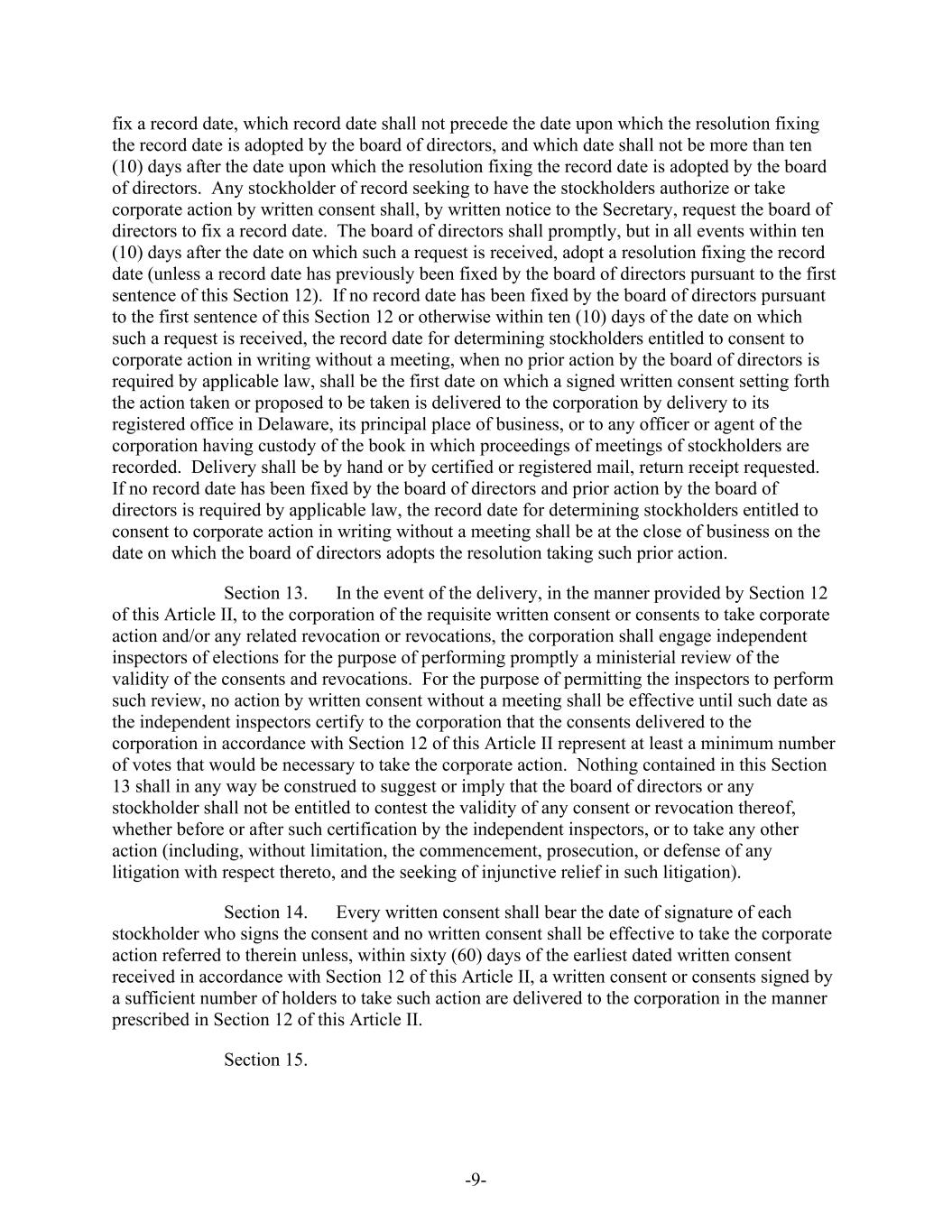
-9- fix a record date, which record date shall not precede the date upon which the resolution fixing the record date is adopted by the board of directors, and which date shall not be more than ten (10) days after the date upon which the resolution fixing the record date is adopted by the board of directors. Any stockholder of record seeking to have the stockholders authorize or take corporate action by written consent shall, by written notice to the Secretary, request the board of directors to fix a record date. The board of directors shall promptly, but in all events within ten (10) days after the date on which such a request is received, adopt a resolution fixing the record date (unless a record date has previously been fixed by the board of directors pursuant to the first sentence of this Section 12). If no record date has been fixed by the board of directors pursuant to the first sentence of this Section 12 or otherwise within ten (10) days of the date on which such a request is received, the record date for determining stockholders entitled to consent to corporate action in writing without a meeting, when no prior action by the board of directors is required by applicable law, shall be the first date on which a signed written consent setting forth the action taken or proposed to be taken is delivered to the corporation by delivery to its registered office in Delaware, its principal place of business, or to any officer or agent of the corporation having custody of the book in which proceedings of meetings of stockholders are recorded. Delivery shall be by hand or by certified or registered mail, return receipt requested. If no record date has been fixed by the board of directors and prior action by the board of directors is required by applicable law, the record date for determining stockholders entitled to consent to corporate action in writing without a meeting shall be at the close of business on the date on which the board of directors adopts the resolution taking such prior action. Section 13. In the event of the delivery, in the manner provided by Section 12 of this Article II, to the corporation of the requisite written consent or consents to take corporate action and/or any related revocation or revocations, the corporation shall engage independent inspectors of elections for the purpose of performing promptly a ministerial review of the validity of the consents and revocations. For the purpose of permitting the inspectors to perform such review, no action by written consent without a meeting shall be effective until such date as the independent inspectors certify to the corporation that the consents delivered to the corporation in accordance with Section 12 of this Article II represent at least a minimum number of votes that would be necessary to take the corporate action. Nothing contained in this Section 13 shall in any way be construed to suggest or imply that the board of directors or any stockholder shall not be entitled to contest the validity of any consent or revocation thereof, whether before or after such certification by the independent inspectors, or to take any other action (including, without limitation, the commencement, prosecution, or defense of any litigation with respect thereto, and the seeking of injunctive relief in such litigation). Section 14. Every written consent shall bear the date of signature of each stockholder who signs the consent and no written consent shall be effective to take the corporate action referred to therein unless, within sixty (60) days of the earliest dated written consent received in accordance with Section 12 of this Article II, a written consent or consents signed by a sufficient number of holders to take such action are delivered to the corporation in the manner prescribed in Section 12 of this Article II. Section 15.

-10- (a) Without qualification or limitation, subject to paragraph (c)(iv) of this Section 15, for any nominations or any other business to be properly brought before an annual meeting by a stockholder, the stockholder must have given timely notice thereof (including, in the case of nominations, the completed and signed questionnaire, representation and agreement required by Section 16 of these By-laws), and timely updates and supplements thereof, in writing to the Secretary, and such other business must otherwise be a proper matter for stockholder action. In addition to such stockholder complying with the provisions of Rule 14a-19 of the Exchange Act (and all other applicable provisions of state or federal law, rule or regulation), to be timely, a stockholder’s notice must have been delivered to or mailed and received at the principal executive offices of the corporation by 5:00 p.m. Central time not less than 90 days nor more than 120 days prior to the first anniversary of the preceding year’s annual meeting; provided, however, that in the event that the date of the annual meeting is more than 30 days before or more than 60 days after such anniversary date, notice by the stockholder must be so delivered to or mailed and received by 5:00 p.m. Central time not less than 90 days nor more than 120 days prior to the date of such annual meeting or, if the first public announcement of the date of such annual meeting is less than 100 days prior to the date of such annual meeting, not more than 10 days following the day on which public announcement of the date of such meeting is first made by the corporation. In no event shall any adjournment of an annual meeting, or the 18/39 public announcement thereof, commence a new time period for the giving of a stockholder’s notice as described above. Notwithstanding anything in the immediately preceding paragraph to the contrary, in the event that the number of directors to be elected to the board of directors is increased by the board of directors, and there is no public announcement by the corporation naming all of the nominees for director or specifying the size of the increased board of directors at least 100 days prior to the first anniversary of the preceding year’s annual meeting, a stockholder’s notice required by this Section 15(a) shall also be considered timely, but only with respect to nominees for any new positions created by such increase, if it shall be delivered to or mailed and received at the principal executive offices of the corporation by 5:00 p.m. Central time not later than 10 days following the day on which such public announcement is first made by the corporation. In addition, to be considered timely, a stockholder’s notice shall further be updated and supplemented, if necessary, so that the information provided or required to be provided in such notice shall be true and correct as of the record date for the meeting and as of the date that is 10 business days prior to the meeting or any adjournment or postponement thereof, and such update and supplement shall be delivered to or mailed and received at the principal executive offices of the corporation not later than five business days after the record date for the meeting in the case of the update and supplement required to be made as of the record date, and not later than 8 business days prior to the date for the meeting or any adjournment or postponement thereof in the case of the update and supplement required to be made as of 10 business days prior to the meeting or any adjournment or postponement thereof. For the avoidance of doubt, the obligation to update and supplement as set forth in this paragraph or any other section of these By-laws shall not limit the corporation’s rights with respect to any deficiencies in any notice provided by a stockholder, extend any
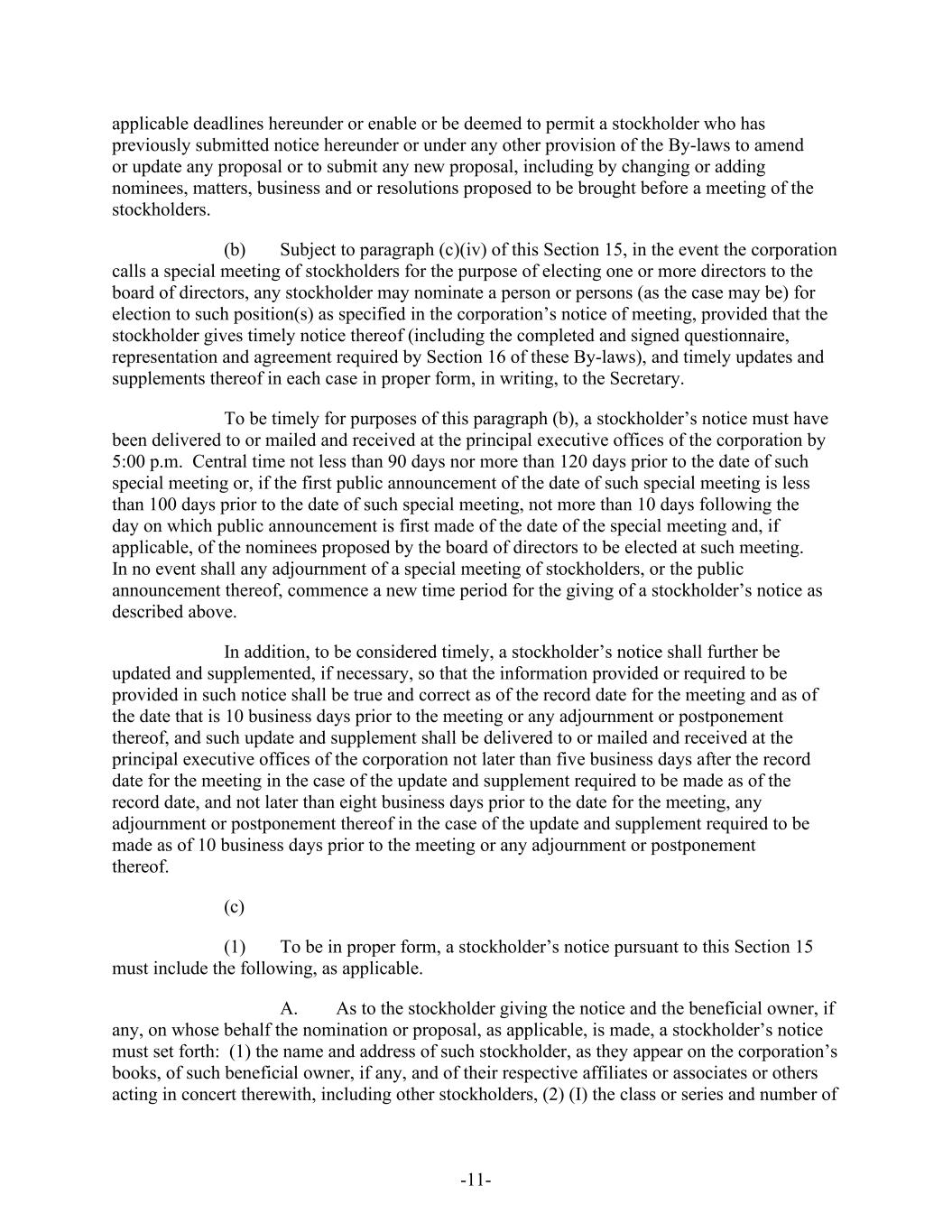
-11- applicable deadlines hereunder or enable or be deemed to permit a stockholder who has previously submitted notice hereunder or under any other provision of the By-laws to amend or update any proposal or to submit any new proposal, including by changing or adding nominees, matters, business and or resolutions proposed to be brought before a meeting of the stockholders. (b) Subject to paragraph (c)(iv) of this Section 15, in the event the corporation calls a special meeting of stockholders for the purpose of electing one or more directors to the board of directors, any stockholder may nominate a person or persons (as the case may be) for election to such position(s) as specified in the corporation’s notice of meeting, provided that the stockholder gives timely notice thereof (including the completed and signed questionnaire, representation and agreement required by Section 16 of these By-laws), and timely updates and supplements thereof in each case in proper form, in writing, to the Secretary. To be timely for purposes of this paragraph (b), a stockholder’s notice must have been delivered to or mailed and received at the principal executive offices of the corporation by 5:00 p.m. Central time not less than 90 days nor more than 120 days prior to the date of such special meeting or, if the first public announcement of the date of such special meeting is less than 100 days prior to the date of such special meeting, not more than 10 days following the day on which public announcement is first made of the date of the special meeting and, if applicable, of the nominees proposed by the board of directors to be elected at such meeting. In no event shall any adjournment of a special meeting of stockholders, or the public announcement thereof, commence a new time period for the giving of a stockholder’s notice as described above. In addition, to be considered timely, a stockholder’s notice shall further be updated and supplemented, if necessary, so that the information provided or required to be provided in such notice shall be true and correct as of the record date for the meeting and as of the date that is 10 business days prior to the meeting or any adjournment or postponement thereof, and such update and supplement shall be delivered to or mailed and received at the principal executive offices of the corporation not later than five business days after the record date for the meeting in the case of the update and supplement required to be made as of the record date, and not later than eight business days prior to the date for the meeting, any adjournment or postponement thereof in the case of the update and supplement required to be made as of 10 business days prior to the meeting or any adjournment or postponement thereof. (c) (1) To be in proper form, a stockholder’s notice pursuant to this Section 15 must include the following, as applicable. A. As to the stockholder giving the notice and the beneficial owner, if any, on whose behalf the nomination or proposal, as applicable, is made, a stockholder’s notice must set forth: (1) the name and address of such stockholder, as they appear on the corporation’s books, of such beneficial owner, if any, and of their respective affiliates or associates or others acting in concert therewith, including other stockholders, (2) (I) the class or series and number of

-12- shares of the corporation which are, directly or indirectly, owned beneficially and of record by such stockholder, such beneficial owner and their respective affiliates or associates or others acting in concert therewith, including other stockholders, (II) any option, warrant, convertible security, stock appreciation right, or similar right with an exercise or conversion privilege or a settlement payment or mechanism at a price related to any class or series of shares of the corporation or with a value derived in whole or in part from the value of any class or series of shares of the corporation, or any derivative or synthetic arrangement having the characteristics of a long position in any class or series of shares of the corporation, or any contract, derivative, swap or other transaction or series of transactions designed to produce economic benefits and risks that correspond substantially to the ownership of any class or series of shares of the corporation, including due to the fact that the value of such contract, derivative, swap or other transaction or series of transactions is determined by reference to the price, value or volatility of any class or series of shares of the corporation, whether or not such instrument, contract or right shall be subject to settlement in the underlying class or series of shares of the corporation, through the delivery of cash or other property, or otherwise, and without regard to whether the stockholder of record, the beneficial owner, if any, or any affiliates or associates or others acting in concert therewith, may have entered into transactions that hedge or mitigate the economic effect of such instrument, contract or right, or any other direct or indirect opportunity to profit or share in any profit derived from any increase or decrease in the value of shares of the corporation (any of the foregoing, a “Derivative Instrument”) directly or indirectly owned beneficially by such stockholder, the beneficial owner, if any, or any affiliates or associates or others acting in concert therewith, (III) any proxy, contract, arrangement, understanding, or relationship pursuant to which such stockholder, such beneficial owner or any of their respective affiliates or associates or others acting in concert therewith has any right to vote any class or series of shares of the corporation, (IV) any agreement, arrangement, understanding, relationship or otherwise, including any repurchase or similar so-called “stock borrowing” agreement or arrangement, involving such stockholder, such beneficial owner or any of their respective affiliates or associates or others acting in concert therewith, directly or indirectly, the purpose or effect of which is to mitigate loss to, reduce the economic risk (of ownership or otherwise) of any class or series of the shares of the corporation by, manage the risk of share price changes for, or increase or decrease the voting power of, such stockholder, such beneficial owner or any of their respective affiliates or associates or others acting in concert therewith with respect to any class or series of the shares of the corporation, or which provides, directly or indirectly, the opportunity to profit or share in any profit derived from any decrease in the price or value of any class or series of the shares of the corporation (any of the foregoing, a “Short Interest”), (V) any rights to dividends on the shares of the corporation owned beneficially by such stockholder, such beneficial owner or any of their respective affiliates or associates or others acting in concert therewith that are separated or separable from the underlying shares of the corporation, (VI) any interest in shares of the corporation or Derivative Instruments held, directly or indirectly, by a general or limited partnership in which such stockholder, such beneficial owner or any of their respective affiliates or associates or others acting in concert therewith is a general partner or, directly or indirectly, beneficially owns an interest in a general partner of such general or limited partnership, (VII) any performance-related fees (other than an asset-based fee) that such stockholder, such beneficial owner or any of their respective affiliates or associates or others acting in concert therewith is entitled to based on any increase or decrease in the value of shares of the corporation or Derivative Instruments, if any, including, without limitation, any such

-13- interests held by members of the immediate family sharing the same household of such stockholder, such beneficial owner and their respective affiliates or associates or others acting in concert therewith, (VIII) any equity interests or any Derivative Instruments or Short Interests in any competitor of the corporation held by such stockholder, such beneficial owner or any of their respective affiliates or associates or others acting in concert therewith, and (IX) any direct or indirect interest of such stockholder, such beneficial owner and their respective affiliates or associates or others acting in concert therewith in any contract with the corporation, any affiliate of the corporation or any competitor of the corporation (including, in any such case, any employment agreement, collective bargaining agreement or consulting agreement), (3) all information that would be required to be set forth in a Schedule 13D filed pursuant to Rule 13d- 1(a) or an amendment pursuant to Rule 13d- 2(a) if such a statement were required to be filed under the Exchange Act and the rules and regulations promulgated thereunder by such stockholder, such beneficial owner and their respective affiliates or associates or others acting in concert therewith, if any, and (4) any other information relating to such stockholder, such beneficial owner or any of their respective affiliates or associates or others acting in concert therewith, if any, that would be required to be disclosed in a proxy statement and form of proxy or other filings required to be made in connection with solicitations of proxies for, as applicable, the proposal and/or for the election of directors in a contested election pursuant to Section 14 of the Exchange Act and the rules and regulations promulgated thereunder; B. If the notice relates to any business other than a nomination of a director or directors that the stockholder proposes to bring before the meeting, a stockholder’s notice must, in addition to the matters set forth in paragraph (A) above, also set forth: (1) a brief description of the business desired to be brought before the meeting, the reasons for conducting such business at the meeting and any material interest of such stockholder, any beneficial owner on whose behalf the proposal is made and each of their respective affiliates or associates or others acting in concert therewith, if any, in such business, (2) the text of the proposal or business (including the text of any resolutions proposed for consideration and, in the event that such proposal or business includes a proposal to amend the By-laws of the corporation, the text of the proposed amendment), and (3) a description of all agreements, arrangements and understandings between such stockholder, such beneficial owner and each of their respective affiliates or associates or others acting in concert therewith, if any, and any other person or persons (including their names) in connection with the proposal of such business by such stockholder; C. As to each person, if any, whom the stockholder proposes to nominate for election or reelection to the board of directors, a stockholder’s notice must, in addition to the matters set forth in paragraph (A) above, also set forth: (1) all information relating to such person that would be required to be disclosed in a proxy statement or other filings required to be made in connection with solicitations of proxies for election of directors in a contested election pursuant to Section 14 of the Exchange Act and the rules and regulations promulgated thereunder (including such person’s written consent to being named in any proxy statement as a nominee and to serving as a director if elected) and (2) a description of all direct and indirect compensation and other material monetary agreements, arrangements and understandings during the past three years, and any other material relationships, between or among such stockholder and beneficial owner, if any, and their respective affiliates and associates, or others acting in concert therewith, on the one hand, and each proposed nominee,

-14- and his or her respective affiliates and associates, or others acting in concert therewith, on the other hand, including, without limitation all information that would be required to be disclosed pursuant to Rule 404 promulgated under, Regulation S-K if the stockholder making the nomination and any beneficial owner on whose behalf the nomination is made, if any, or any affiliate or associate thereof or person acting in concert therewith, were the “registrant” for purposes of such rule and the nominee were a director or executive officer of such registrant; and D. With respect to each person, if any, whom the stockholder proposes to nominate for election or reelection to the board of directors, a stockholder’s notice must, in addition to the matters set forth in paragraphs (A) and (C) above, also include a completed and signed questionnaire, representation and agreement required by Section 16 of this Article II. The corporation may require any proposed nominee to furnish such other information as may reasonably be required by the corporation to determine the eligibility of such proposed nominee to serve as an independent director of the corporation or that could be material to a reasonable stockholder’s understanding of the independence, or lack thereof, of such nominee. Notwithstanding anything to the contrary, only persons who are nominated in accordance with the procedures set forth in these By-laws shall be eligible for election as directors. E. A stockholder who has delivered a notice of nomination pursuant to Section 15(a), shall promptly certify to the corporation, and notify the corporation in writing, that it has complied with or will comply with the requirements of Rule 14a-19(a) (including for the avoidance of doubt Rule 14a-19(a)(3) which provides that “No person may solicit proxies in support of director nominees other than the registrant’s nominees unless such person: . . . . Solicits the holders of shares representing at least 67% of the voting power of shares entitled to vote on the election of directors and includes a statement to that effect in the proxy statement or form of proxy.”) and upon request of the corporation, shall, not later than five (5) business days prior to date of the applicable meeting of stockholders, deliver to the corporation reasonable evidence of such compliance. (2) For purposes of these By-laws, “public announcement” shall mean disclosure in a press release reported by a national news service or in a document publicly filed by the corporation with the Securities and Exchange Commission pursuant to Section 13, 14 or 15(d) of the Exchange Act and the rules and regulations promulgated thereunder. (3) Notwithstanding the provisions of these By-laws, a stockholder shall also comply with all applicable requirements of the Exchange Act and the rules and regulations thereunder with respect to the matters set forth in this By-law, for the avoidance of doubt including but not limited to Rule 14a-19 of the Exchange Act; provided, however, that any references in these By-laws to the Exchange Act or the rules promulgated thereunder are not intended to and shall not limit the separate and additional requirements set forth in these By-laws with respect to nominations or proposals as to any other business to be considered. (4) Nothing in these By-laws shall be deemed to affect any rights (1) of stockholders to request inclusion of proposals in the corporation’s proxy statement pursuant to Rule 14a-8 under the Exchange Act, (2) of any Eligible Stockholder to submit Nominees in accordance with Section 2(b) of this Article II, or (3) of the holders of any series of preferred
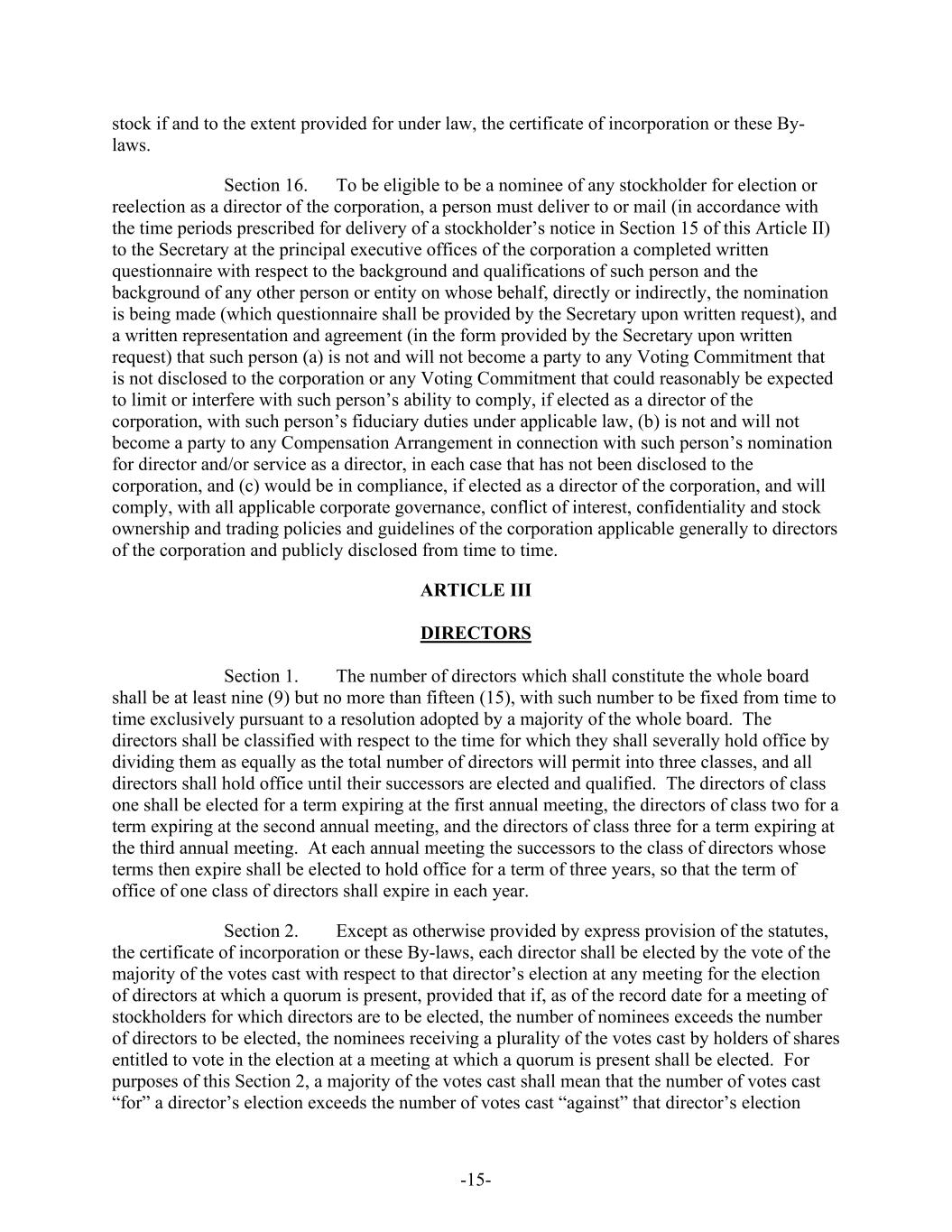
-15- stock if and to the extent provided for under law, the certificate of incorporation or these By- laws. Section 16. To be eligible to be a nominee of any stockholder for election or reelection as a director of the corporation, a person must deliver to or mail (in accordance with the time periods prescribed for delivery of a stockholder’s notice in Section 15 of this Article II) to the Secretary at the principal executive offices of the corporation a completed written questionnaire with respect to the background and qualifications of such person and the background of any other person or entity on whose behalf, directly or indirectly, the nomination is being made (which questionnaire shall be provided by the Secretary upon written request), and a written representation and agreement (in the form provided by the Secretary upon written request) that such person (a) is not and will not become a party to any Voting Commitment that is not disclosed to the corporation or any Voting Commitment that could reasonably be expected to limit or interfere with such person’s ability to comply, if elected as a director of the corporation, with such person’s fiduciary duties under applicable law, (b) is not and will not become a party to any Compensation Arrangement in connection with such person’s nomination for director and/or service as a director, in each case that has not been disclosed to the corporation, and (c) would be in compliance, if elected as a director of the corporation, and will comply, with all applicable corporate governance, conflict of interest, confidentiality and stock ownership and trading policies and guidelines of the corporation applicable generally to directors of the corporation and publicly disclosed from time to time. ARTICLE III DIRECTORS Section 1. The number of directors which shall constitute the whole board shall be at least nine (9) but no more than fifteen (15), with such number to be fixed from time to time exclusively pursuant to a resolution adopted by a majority of the whole board. The directors shall be classified with respect to the time for which they shall severally hold office by dividing them as equally as the total number of directors will permit into three classes, and all directors shall hold office until their successors are elected and qualified. The directors of class one shall be elected for a term expiring at the first annual meeting, the directors of class two for a term expiring at the second annual meeting, and the directors of class three for a term expiring at the third annual meeting. At each annual meeting the successors to the class of directors whose terms then expire shall be elected to hold office for a term of three years, so that the term of office of one class of directors shall expire in each year. Section 2. Except as otherwise provided by express provision of the statutes, the certificate of incorporation or these By-laws, each director shall be elected by the vote of the majority of the votes cast with respect to that director’s election at any meeting for the election of directors at which a quorum is present, provided that if, as of the record date for a meeting of stockholders for which directors are to be elected, the number of nominees exceeds the number of directors to be elected, the nominees receiving a plurality of the votes cast by holders of shares entitled to vote in the election at a meeting at which a quorum is present shall be elected. For purposes of this Section 2, a majority of the votes cast shall mean that the number of votes cast “for” a director’s election exceeds the number of votes cast “against” that director’s election
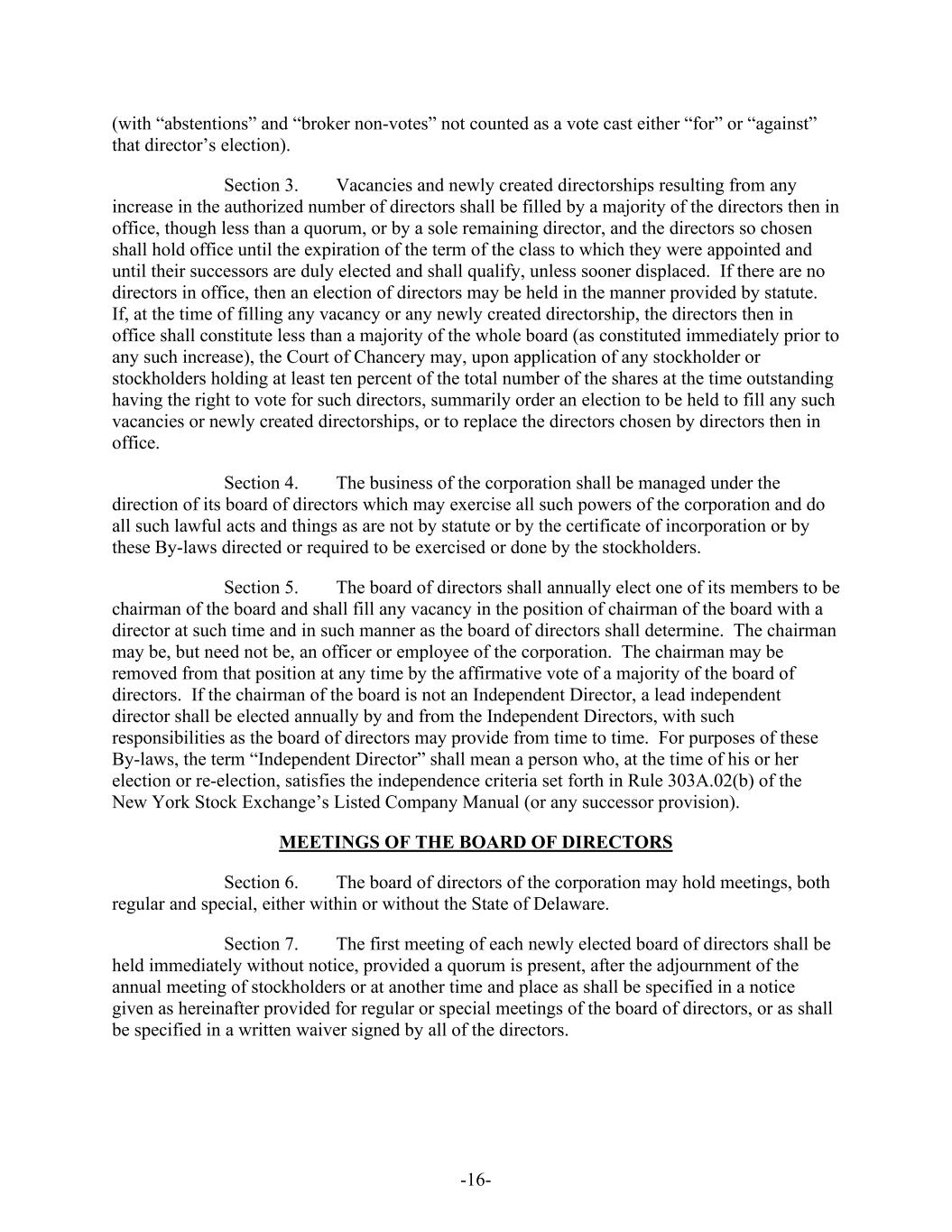
-16- (with “abstentions” and “broker non-votes” not counted as a vote cast either “for” or “against” that director’s election). Section 3. Vacancies and newly created directorships resulting from any increase in the authorized number of directors shall be filled by a majority of the directors then in office, though less than a quorum, or by a sole remaining director, and the directors so chosen shall hold office until the expiration of the term of the class to which they were appointed and until their successors are duly elected and shall qualify, unless sooner displaced. If there are no directors in office, then an election of directors may be held in the manner provided by statute. If, at the time of filling any vacancy or any newly created directorship, the directors then in office shall constitute less than a majority of the whole board (as constituted immediately prior to any such increase), the Court of Chancery may, upon application of any stockholder or stockholders holding at least ten percent of the total number of the shares at the time outstanding having the right to vote for such directors, summarily order an election to be held to fill any such vacancies or newly created directorships, or to replace the directors chosen by directors then in office. Section 4. The business of the corporation shall be managed under the direction of its board of directors which may exercise all such powers of the corporation and do all such lawful acts and things as are not by statute or by the certificate of incorporation or by these By-laws directed or required to be exercised or done by the stockholders. Section 5. The board of directors shall annually elect one of its members to be chairman of the board and shall fill any vacancy in the position of chairman of the board with a director at such time and in such manner as the board of directors shall determine. The chairman may be, but need not be, an officer or employee of the corporation. The chairman may be removed from that position at any time by the affirmative vote of a majority of the board of directors. If the chairman of the board is not an Independent Director, a lead independent director shall be elected annually by and from the Independent Directors, with such responsibilities as the board of directors may provide from time to time. For purposes of these By-laws, the term “Independent Director” shall mean a person who, at the time of his or her election or re-election, satisfies the independence criteria set forth in Rule 303A.02(b) of the New York Stock Exchange’s Listed Company Manual (or any successor provision). MEETINGS OF THE BOARD OF DIRECTORS Section 6. The board of directors of the corporation may hold meetings, both regular and special, either within or without the State of Delaware. Section 7. The first meeting of each newly elected board of directors shall be held immediately without notice, provided a quorum is present, after the adjournment of the annual meeting of stockholders or at another time and place as shall be specified in a notice given as hereinafter provided for regular or special meetings of the board of directors, or as shall be specified in a written waiver signed by all of the directors.
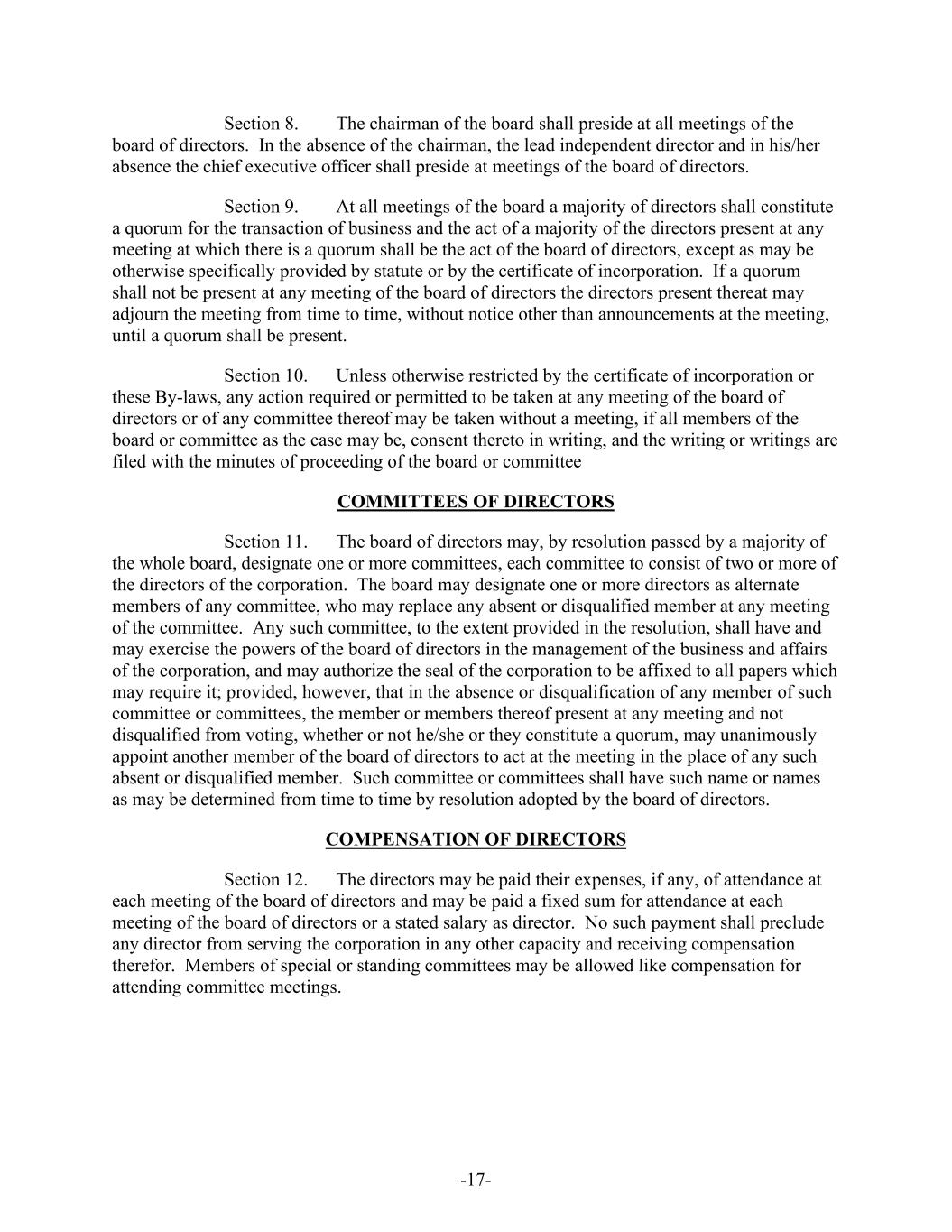
-17- Section 8. The chairman of the board shall preside at all meetings of the board of directors. In the absence of the chairman, the lead independent director and in his/her absence the chief executive officer shall preside at meetings of the board of directors. Section 9. At all meetings of the board a majority of directors shall constitute a quorum for the transaction of business and the act of a majority of the directors present at any meeting at which there is a quorum shall be the act of the board of directors, except as may be otherwise specifically provided by statute or by the certificate of incorporation. If a quorum shall not be present at any meeting of the board of directors the directors present thereat may adjourn the meeting from time to time, without notice other than announcements at the meeting, until a quorum shall be present. Section 10. Unless otherwise restricted by the certificate of incorporation or these By-laws, any action required or permitted to be taken at any meeting of the board of directors or of any committee thereof may be taken without a meeting, if all members of the board or committee as the case may be, consent thereto in writing, and the writing or writings are filed with the minutes of proceeding of the board or committee COMMITTEES OF DIRECTORS Section 11. The board of directors may, by resolution passed by a majority of the whole board, designate one or more committees, each committee to consist of two or more of the directors of the corporation. The board may designate one or more directors as alternate members of any committee, who may replace any absent or disqualified member at any meeting of the committee. Any such committee, to the extent provided in the resolution, shall have and may exercise the powers of the board of directors in the management of the business and affairs of the corporation, and may authorize the seal of the corporation to be affixed to all papers which may require it; provided, however, that in the absence or disqualification of any member of such committee or committees, the member or members thereof present at any meeting and not disqualified from voting, whether or not he/she or they constitute a quorum, may unanimously appoint another member of the board of directors to act at the meeting in the place of any such absent or disqualified member. Such committee or committees shall have such name or names as may be determined from time to time by resolution adopted by the board of directors. COMPENSATION OF DIRECTORS Section 12. The directors may be paid their expenses, if any, of attendance at each meeting of the board of directors and may be paid a fixed sum for attendance at each meeting of the board of directors or a stated salary as director. No such payment shall preclude any director from serving the corporation in any other capacity and receiving compensation therefor. Members of special or standing committees may be allowed like compensation for attending committee meetings.
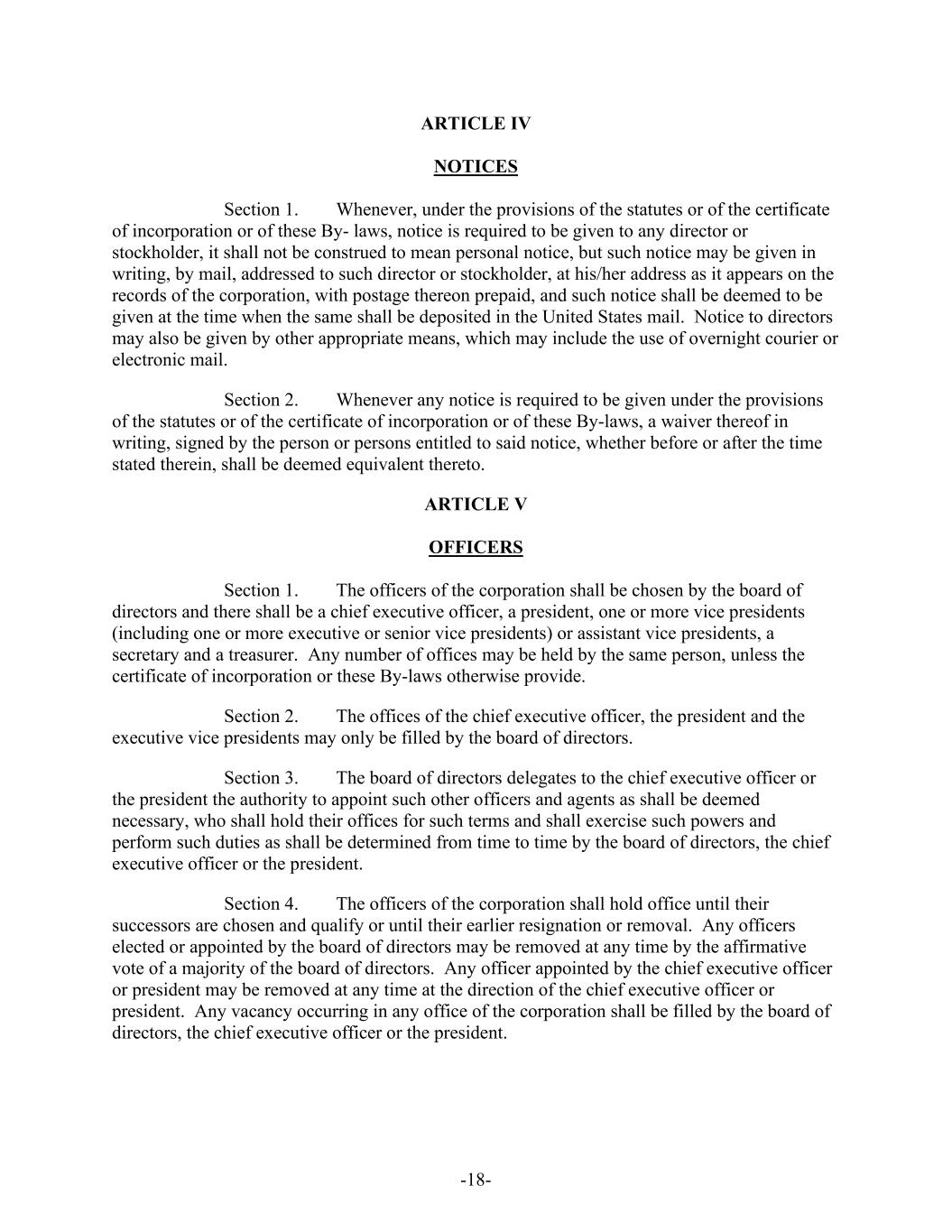
-18- ARTICLE IV NOTICES Section 1. Whenever, under the provisions of the statutes or of the certificate of incorporation or of these By- laws, notice is required to be given to any director or stockholder, it shall not be construed to mean personal notice, but such notice may be given in writing, by mail, addressed to such director or stockholder, at his/her address as it appears on the records of the corporation, with postage thereon prepaid, and such notice shall be deemed to be given at the time when the same shall be deposited in the United States mail. Notice to directors may also be given by other appropriate means, which may include the use of overnight courier or electronic mail. Section 2. Whenever any notice is required to be given under the provisions of the statutes or of the certificate of incorporation or of these By-laws, a waiver thereof in writing, signed by the person or persons entitled to said notice, whether before or after the time stated therein, shall be deemed equivalent thereto. ARTICLE V OFFICERS Section 1. The officers of the corporation shall be chosen by the board of directors and there shall be a chief executive officer, a president, one or more vice presidents (including one or more executive or senior vice presidents) or assistant vice presidents, a secretary and a treasurer. Any number of offices may be held by the same person, unless the certificate of incorporation or these By-laws otherwise provide. Section 2. The offices of the chief executive officer, the president and the executive vice presidents may only be filled by the board of directors. Section 3. The board of directors delegates to the chief executive officer or the president the authority to appoint such other officers and agents as shall be deemed necessary, who shall hold their offices for such terms and shall exercise such powers and perform such duties as shall be determined from time to time by the board of directors, the chief executive officer or the president. Section 4. The officers of the corporation shall hold office until their successors are chosen and qualify or until their earlier resignation or removal. Any officers elected or appointed by the board of directors may be removed at any time by the affirmative vote of a majority of the board of directors. Any officer appointed by the chief executive officer or president may be removed at any time at the direction of the chief executive officer or president. Any vacancy occurring in any office of the corporation shall be filled by the board of directors, the chief executive officer or the president.
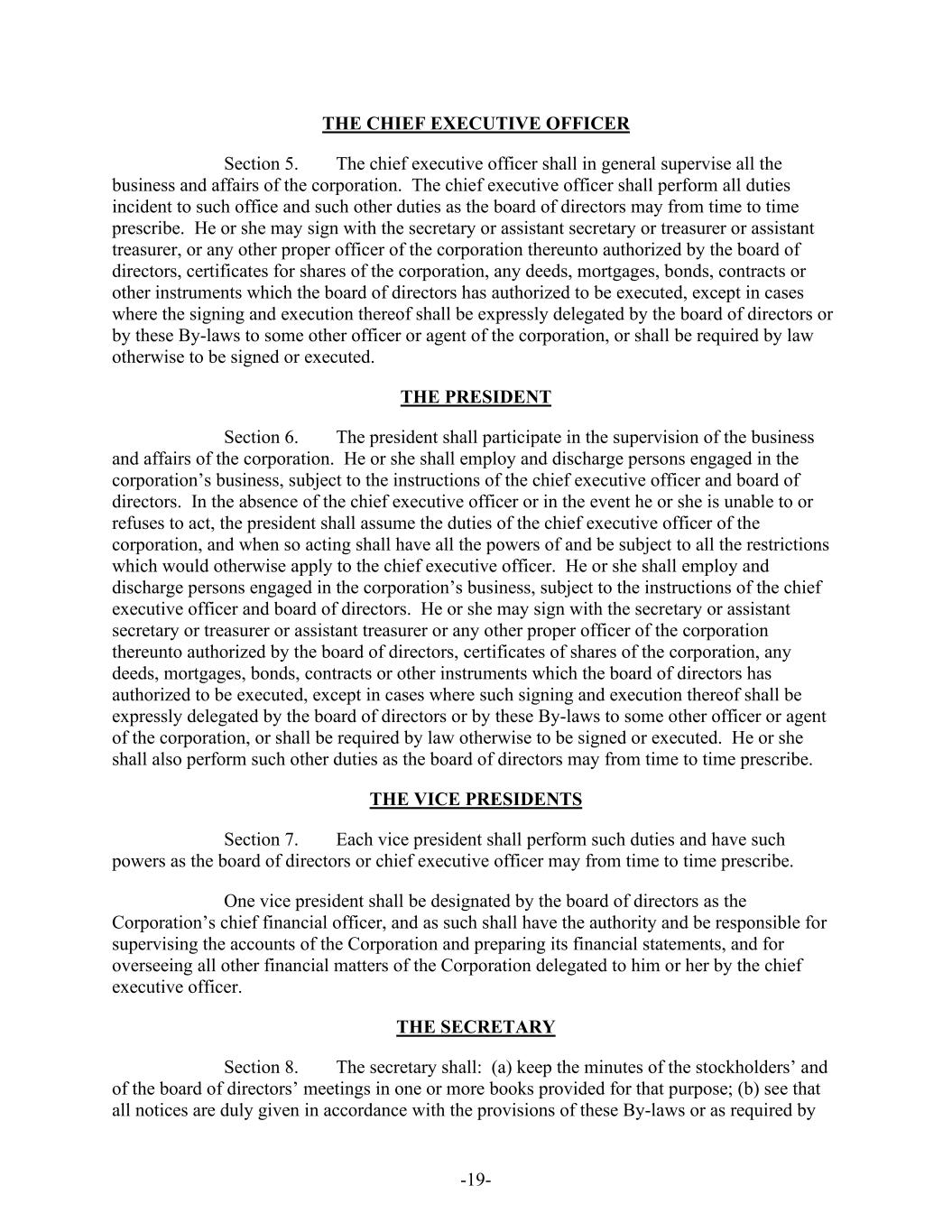
-19- THE CHIEF EXECUTIVE OFFICER Section 5. The chief executive officer shall in general supervise all the business and affairs of the corporation. The chief executive officer shall perform all duties incident to such office and such other duties as the board of directors may from time to time prescribe. He or she may sign with the secretary or assistant secretary or treasurer or assistant treasurer, or any other proper officer of the corporation thereunto authorized by the board of directors, certificates for shares of the corporation, any deeds, mortgages, bonds, contracts or other instruments which the board of directors has authorized to be executed, except in cases where the signing and execution thereof shall be expressly delegated by the board of directors or by these By-laws to some other officer or agent of the corporation, or shall be required by law otherwise to be signed or executed. THE PRESIDENT Section 6. The president shall participate in the supervision of the business and affairs of the corporation. He or she shall employ and discharge persons engaged in the corporation’s business, subject to the instructions of the chief executive officer and board of directors. In the absence of the chief executive officer or in the event he or she is unable to or refuses to act, the president shall assume the duties of the chief executive officer of the corporation, and when so acting shall have all the powers of and be subject to all the restrictions which would otherwise apply to the chief executive officer. He or she shall employ and discharge persons engaged in the corporation’s business, subject to the instructions of the chief executive officer and board of directors. He or she may sign with the secretary or assistant secretary or treasurer or assistant treasurer or any other proper officer of the corporation thereunto authorized by the board of directors, certificates of shares of the corporation, any deeds, mortgages, bonds, contracts or other instruments which the board of directors has authorized to be executed, except in cases where such signing and execution thereof shall be expressly delegated by the board of directors or by these By-laws to some other officer or agent of the corporation, or shall be required by law otherwise to be signed or executed. He or she shall also perform such other duties as the board of directors may from time to time prescribe. THE VICE PRESIDENTS Section 7. Each vice president shall perform such duties and have such powers as the board of directors or chief executive officer may from time to time prescribe. One vice president shall be designated by the board of directors as the Corporation’s chief financial officer, and as such shall have the authority and be responsible for supervising the accounts of the Corporation and preparing its financial statements, and for overseeing all other financial matters of the Corporation delegated to him or her by the chief executive officer. THE SECRETARY Section 8. The secretary shall: (a) keep the minutes of the stockholders’ and of the board of directors’ meetings in one or more books provided for that purpose; (b) see that all notices are duly given in accordance with the provisions of these By-laws or as required by
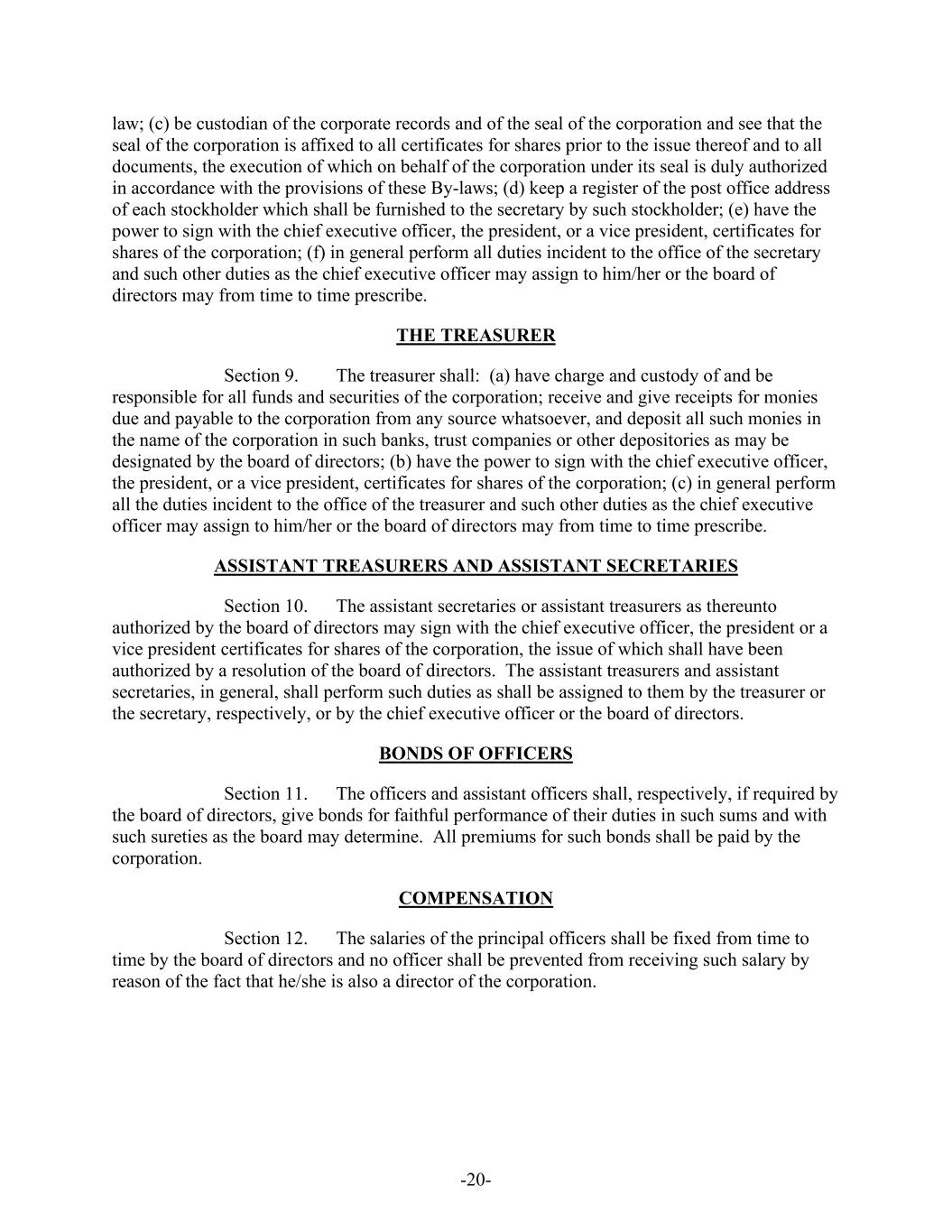
-20- law; (c) be custodian of the corporate records and of the seal of the corporation and see that the seal of the corporation is affixed to all certificates for shares prior to the issue thereof and to all documents, the execution of which on behalf of the corporation under its seal is duly authorized in accordance with the provisions of these By-laws; (d) keep a register of the post office address of each stockholder which shall be furnished to the secretary by such stockholder; (e) have the power to sign with the chief executive officer, the president, or a vice president, certificates for shares of the corporation; (f) in general perform all duties incident to the office of the secretary and such other duties as the chief executive officer may assign to him/her or the board of directors may from time to time prescribe. THE TREASURER Section 9. The treasurer shall: (a) have charge and custody of and be responsible for all funds and securities of the corporation; receive and give receipts for monies due and payable to the corporation from any source whatsoever, and deposit all such monies in the name of the corporation in such banks, trust companies or other depositories as may be designated by the board of directors; (b) have the power to sign with the chief executive officer, the president, or a vice president, certificates for shares of the corporation; (c) in general perform all the duties incident to the office of the treasurer and such other duties as the chief executive officer may assign to him/her or the board of directors may from time to time prescribe. ASSISTANT TREASURERS AND ASSISTANT SECRETARIES Section 10. The assistant secretaries or assistant treasurers as thereunto authorized by the board of directors may sign with the chief executive officer, the president or a vice president certificates for shares of the corporation, the issue of which shall have been authorized by a resolution of the board of directors. The assistant treasurers and assistant secretaries, in general, shall perform such duties as shall be assigned to them by the treasurer or the secretary, respectively, or by the chief executive officer or the board of directors. BONDS OF OFFICERS Section 11. The officers and assistant officers shall, respectively, if required by the board of directors, give bonds for faithful performance of their duties in such sums and with such sureties as the board may determine. All premiums for such bonds shall be paid by the corporation. COMPENSATION Section 12. The salaries of the principal officers shall be fixed from time to time by the board of directors and no officer shall be prevented from receiving such salary by reason of the fact that he/she is also a director of the corporation.

-21- ARTICLE VI CERTIFICATES OF STOCK; UNCERTIFICATED SHARES Section 1. Unless otherwise required by applicable law or authorized by the board of directors or the Secretary of the corporation, from and after January 1, 2023, all shares of any or all of the corporation’s classes or series of stock shall be issued, recorded and transferred exclusively in uncertificated book-entry form in accordance with a direct registration program operated by a clearing agency registered under Section 17A of the United States Securities and Exchange Act. Any certificates for shares of the corporation that were issued prior to January 1, 2023 shall continue to be certificated securities of the corporation until the certificates therefor have been surrendered to the corporation. Section 2. Within a reasonable time after the issuance or transfer of uncertificated shares, the corporation shall send to the registered owner thereof a written notice containing the information required to be set forth or stated on certificates pursuant to the Delaware General Corporation Law or a statement that the corporation will furnish without charge to each stockholder who so requests the powers, designations, preferences and relative participating, optional or other special rights of each class of stock or series thereof and the qualifications, limitations or restrictions of such preferences and/or rights. Section 3. Subject to Section 1 of this Article VI, certificates for shares of stock of the corporation shall be issued only to the extent as may be required by applicable law or as authorized by the board of directors or the Secretary of the corporation, and if so issued shall be in such form as shall be approved by the board of directors. Any certificates for shares represented by certificates shall be signed by, or in the name of the corporation by, the chief executive officer, or the president or a vice president and the treasurer or an assistant treasurer, or the secretary or an assistant secretary of the corporation, certifying the number of shares owned by him/her in the corporation. Section 4. Where a certificate is countersigned (1) by a transfer agent other than the corporation or its employee, or (2) by a registrar other than the corporation or its employee, any other signature on the certificate may be facsimile. In case any officer, transfer agent or registrar who has signed or whose facsimile signature has been placed upon a certificate shall have ceased to be such officer, transfer agent or registrar before such certificate is issued, it may be issued by the corporation with the same effect as if he/she were such officer, transfer agent or registrar at the date of issue. LOST CERTIFICATES Section 5. The board of directors may direct new uncertificated shares (or, if and as directed by the board of directors or the Secretary of the corporation, certificates for such shares) to be issued (or provide for the manner of their being issued) in place of any certificate theretofore issued by the corporation alleged to have been lost, stolen or destroyed, upon the making of an affidavit of that fact by the person claiming the certificate of stock to be lost, stolen or destroyed. When authorizing such issue of new uncertificated shares (or certificates if in certificated form), the board of directors may, in its discretion and as a condition precedent to the

-22- issuance thereof, require the owner of such lost, stolen or destroyed certificate, or his/her legal representative, to advertise the same in such manner as it shall require and/or to give the corporation a bond in such sum or other security as it may direct as indemnity against any claim that may be made against the corporation with respect to the certificate alleged to have been lost, stolen or destroyed. The board of directors may adopt such other provisions and restrictions with reference to lost certificates, not inconsistent with applicable law, as it shall in its discretion deem appropriate. TRANSFERS OF STOCK Section 6. Transfers of shares of capital stock of the corporation shall be made only on the stock record of the corporation by the holder of record thereof or by his/her attorney thereunto authorized by the power of attorney duly executed and filed with the Secretary of the corporation or the transfer agent thereof and upon receipt of proper transfer instructions from the registered owner of such shares, or from a duly authorized attorney or from an individual presenting proper evidence of succession, assignment or authority to transfer the stock or, in the case of certificated shares, only on surrender of any certificate or certificates representing such shares, properly endorsed or accompanied by a duly executed stock transfer power. Transfers of shares of capital stock of the corporation may also be made in accordance with the direct registration system contemplated by Section 1 of this Article VI and applicable rules and regulations pertinent to such system. The board of directors may also make such additional rules and regulations as it may deem expedient concerning the issue, transfer and registration of uncertificated shares or certificates for shares of the capital stock of the Company. FIXING RECORD DATE Section 7. In order that the corporation may determine the stockholders entitled to notice of or to vote at any meeting of stockholders or any adjournment thereof, or to express consent to corporate action in writing without a meeting, or entitled to receive payment of any dividend or other distribution or allotment of any rights, or entitled to exercise any rights in respect of any change, conversion or exchange of stock or for the purpose of any other lawful action, the board of directors may fix, in advance, a record date, which shall not be more than sixty days nor less than ten days before the date of such meeting, nor more than sixty days prior to any other action. A determination of stockholders of record entitled to notice of or to vote at a meeting of stockholders shall apply to any adjournment of the meeting; provided, however, that the board of directors may fix a new record date for the adjourned meeting. REGISTERED STOCKHOLDERS Section 8. The corporation shall be entitled to recognize the exclusive right of a person registered on its books as the owner of shares to receive dividends, and to vote as such owner, and to hold liable for calls and assessments a person registered on its books as the owner of shares, and shall not be bound to recognize any equitable or other claim to or interest in such share or shares on the part of any other person, whether or not it shall have express or other notice thereof, except as otherwise provided by the laws of Delaware.
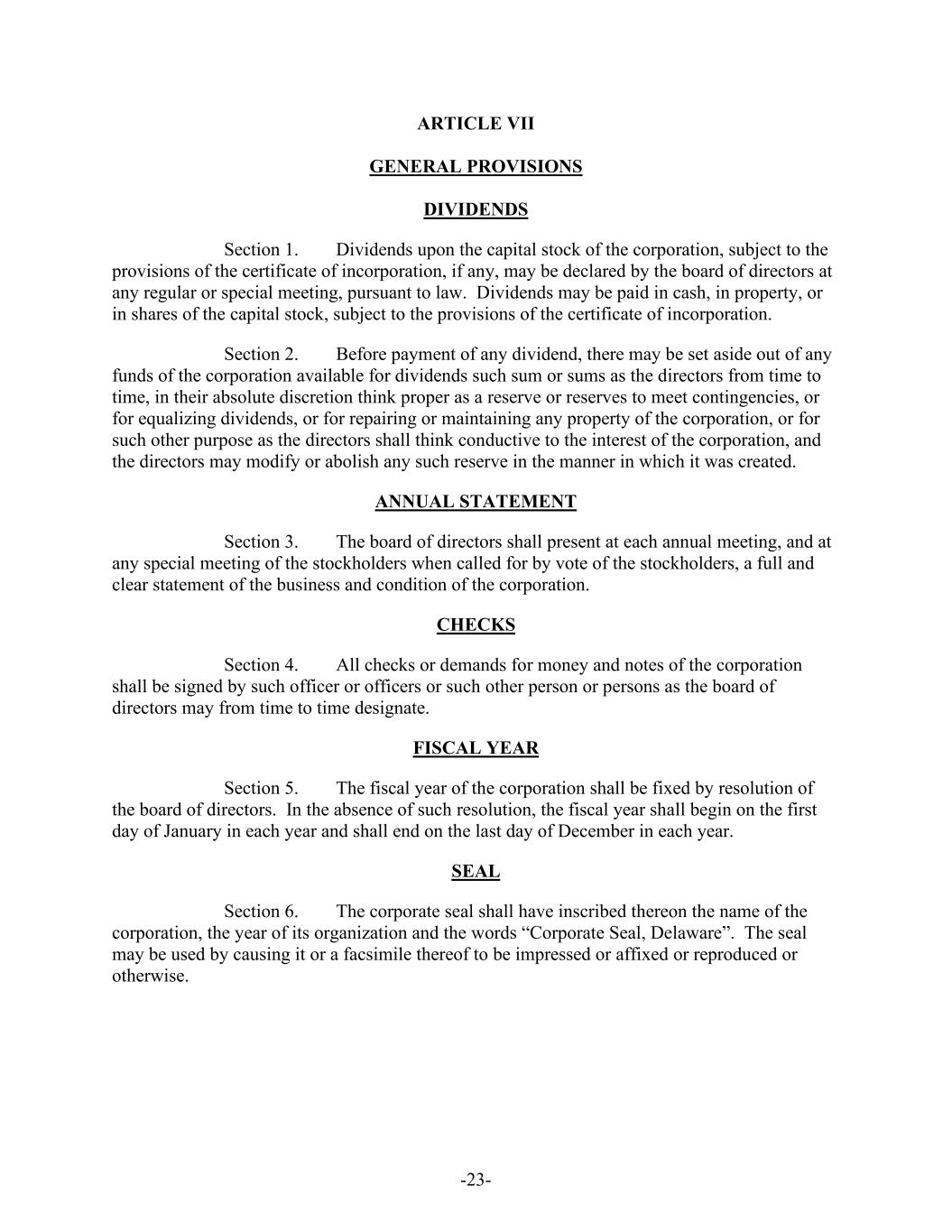
-23- ARTICLE VII GENERAL PROVISIONS DIVIDENDS Section 1. Dividends upon the capital stock of the corporation, subject to the provisions of the certificate of incorporation, if any, may be declared by the board of directors at any regular or special meeting, pursuant to law. Dividends may be paid in cash, in property, or in shares of the capital stock, subject to the provisions of the certificate of incorporation. Section 2. Before payment of any dividend, there may be set aside out of any funds of the corporation available for dividends such sum or sums as the directors from time to time, in their absolute discretion think proper as a reserve or reserves to meet contingencies, or for equalizing dividends, or for repairing or maintaining any property of the corporation, or for such other purpose as the directors shall think conductive to the interest of the corporation, and the directors may modify or abolish any such reserve in the manner in which it was created. ANNUAL STATEMENT Section 3. The board of directors shall present at each annual meeting, and at any special meeting of the stockholders when called for by vote of the stockholders, a full and clear statement of the business and condition of the corporation. CHECKS Section 4. All checks or demands for money and notes of the corporation shall be signed by such officer or officers or such other person or persons as the board of directors may from time to time designate. FISCAL YEAR Section 5. The fiscal year of the corporation shall be fixed by resolution of the board of directors. In the absence of such resolution, the fiscal year shall begin on the first day of January in each year and shall end on the last day of December in each year. SEAL Section 6. The corporate seal shall have inscribed thereon the name of the corporation, the year of its organization and the words “Corporate Seal, Delaware”. The seal may be used by causing it or a facsimile thereof to be impressed or affixed or reproduced or otherwise.

-24- ARTICLE VIII AMENDMENTS Section 1. These By-laws may be altered, amended or repealed or new By- laws may be adopted by the board of directors, when such power is conferred upon the board of directors by the certificate of incorporation, at any regular meeting of the board of directors or at any special meeting of the board of directors if notice of such alteration, amendment, repeal or adoption of new By-laws be contained in the notice of such special meeting of the directors. These By-laws may be altered, amended or repealed or new By-laws may be adopted by stockholders of the corporation at any regular meeting of the stockholders; provided, however, that in addition to any separate class vote, if any, which may be required by law, the affirmative vote of the holders of 66% of the outstanding shares of all classes of stock of the corporation entitled to vote in the election of directors, such outstanding shares of stock to be considered as one class, shall be required in order to alter, amend, or repeal any of the provisions of these By- laws. ARTICLE IX EXCLUSIVE FORUM Section 1. Unless the corporation consents in writing to the selection of an alternative forum, the Court of Chancery of the State of Delaware (or, if such court does not have subject matter jurisdiction thereof, the federal district court of the State of Delaware) shall, to the fullest extent permitted by law, be the sole and exclusive forum for (i) any derivative action or proceeding brought on behalf of the corporation, (ii) any action asserting a claim for or based on a breach of a fiduciary duty owed by any current or former director, officer, employee, agent or stockholder of the corporation to the corporation or the corporation’s stockholders, including a claim alleging the aiding and abetting of such a breach of fiduciary duty, (iii) any action asserting a claim against the corporation or any current or former director, officer, employee, agent or stockholder of the corporation arising pursuant to any provision of the Delaware General Corporation Law or the corporation’s Certificate of Incorporation or By-laws (as either may be amended from time to time), or (iv) any action asserting a claim against the corporation or any current or former director, officer, employee, agent or stockholder of the corporation governed by the internal affairs doctrine. If any action the subject matter of which is within the scope of the preceding sentence is filed in a court other than the Court of Chancery (or, if the Court of Chancery does not have jurisdiction, the federal district court of the State of Delaware) (a “foreign action”) in the name of any stockholder (including any current or former beneficial owner), such stockholder shall be deemed to have consented to (i) the personal jurisdiction of the Court of Chancery (or the federal district court of the State of Delaware, as applicable) in connection with any action brought in any such court to enforce the preceding sentence and (ii) having service of process made upon such stockholder in any such action by service upon such stockholder’s counsel in the foreign action as agent for such stockholder. Failure to enforce the foregoing provisions would cause the corporation irreparable harm, and the corporation shall be entitled to equitable relief, including injunctive relief and specific performance, to enforce the foregoing provisions. Unless the corporation consents in writing to the selection of an alternative forum, the federal district courts of the United States of America shall, to the fullest

-25- extent permitted by law, be the sole and exclusive forum for the resolution of any complaint asserting a cause of action arising under the Securities Act or the Exchange Act, and the rules and regulations promulgated thereunder.
























